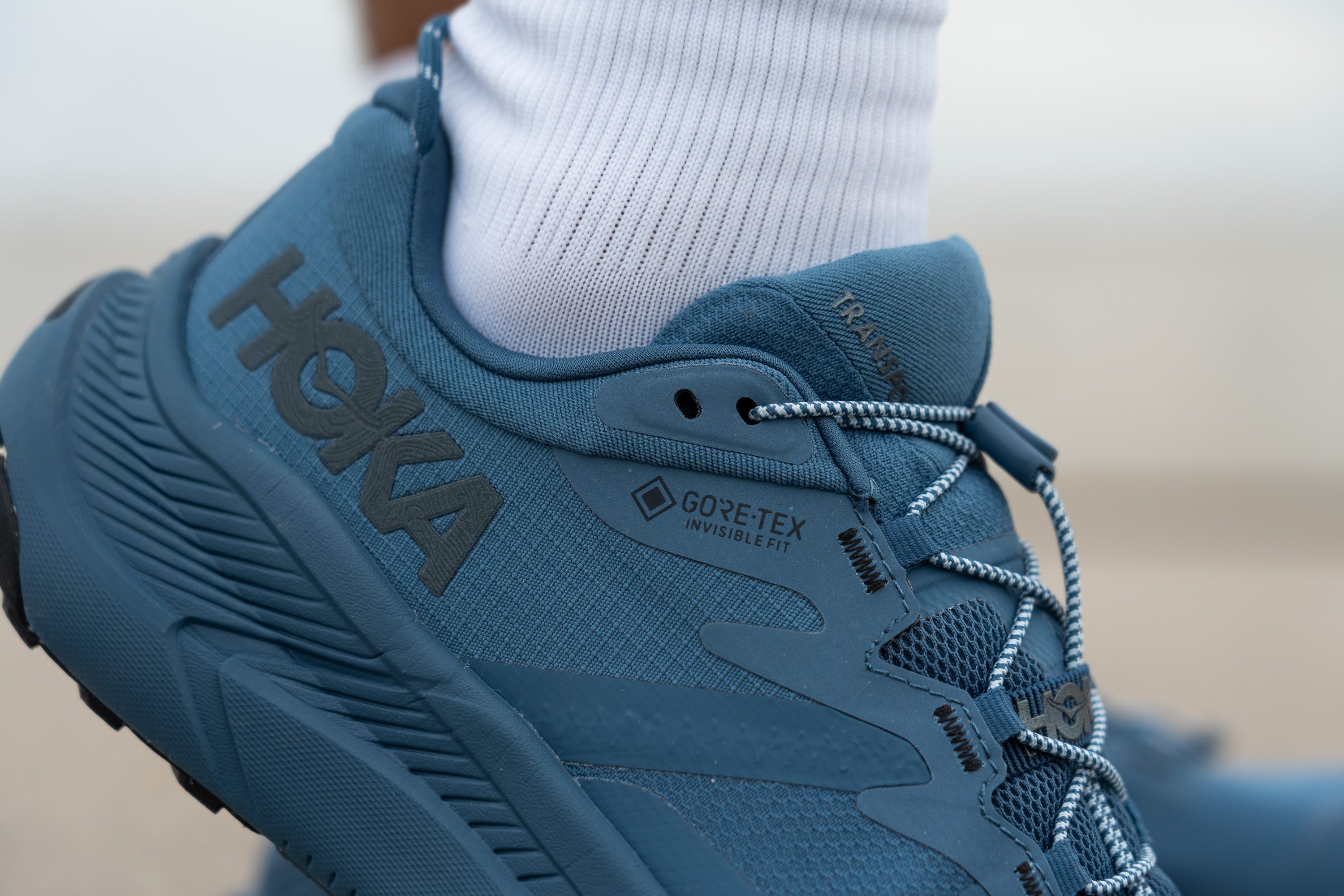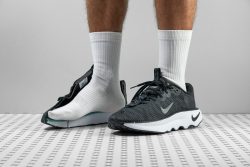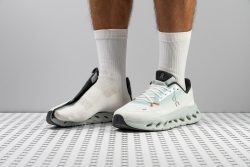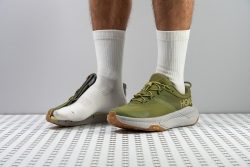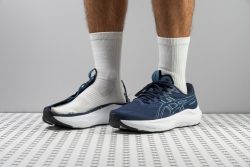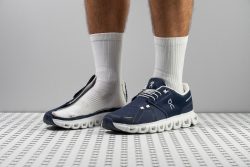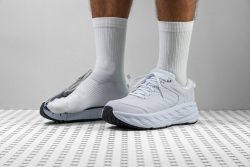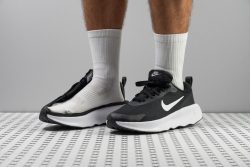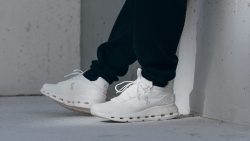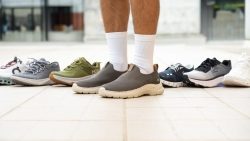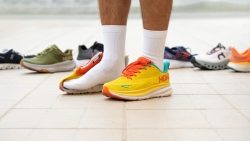7 Best Walking Shoes For Women in 2025
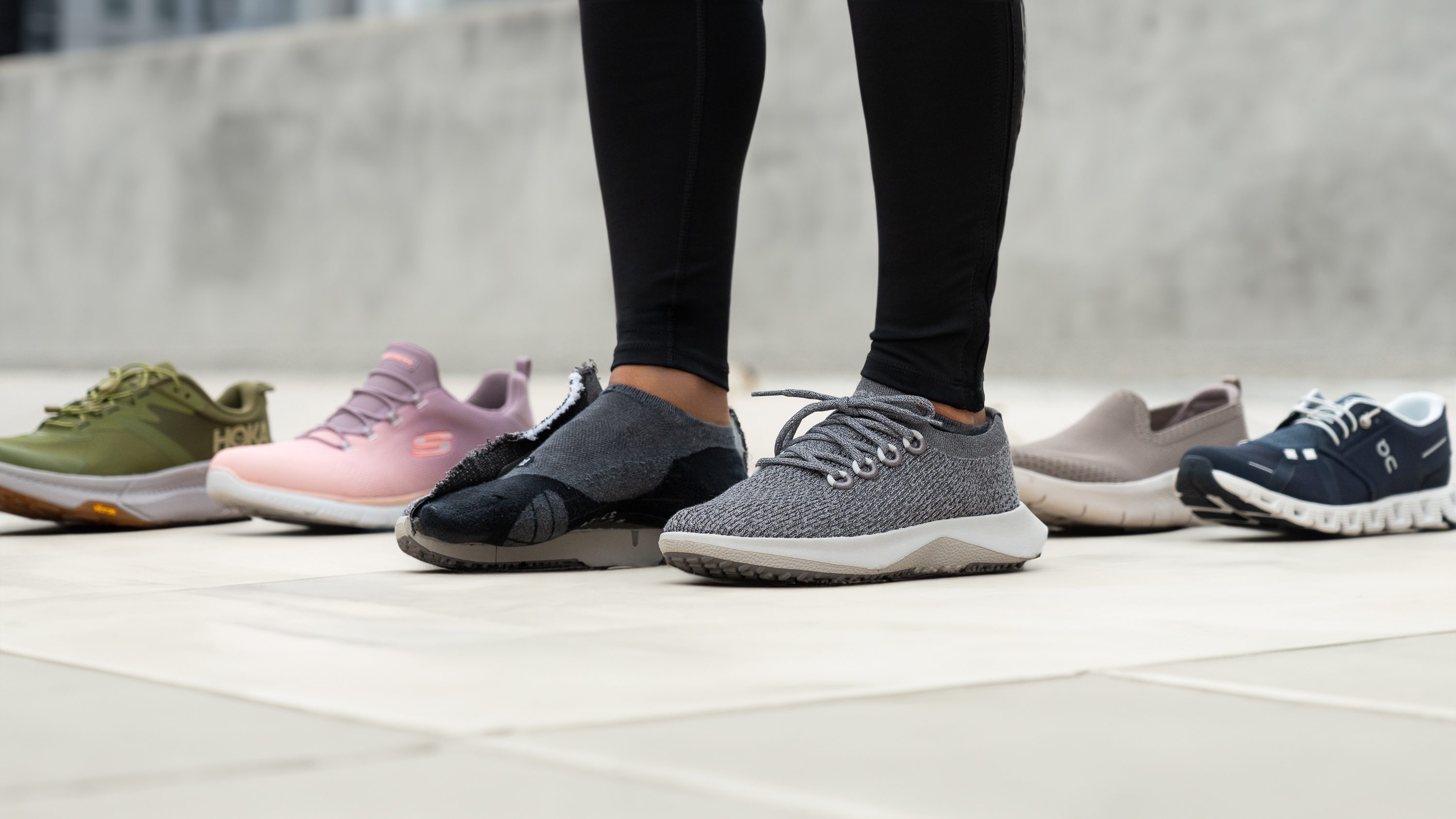
We buy shoes ourselves. We earn commissions when you buy through us, at no extra cost. Why trust us
What makes a great pair of women’s walking shoes?
In addition to keeping you comfortable for hours, the right walking shoe significantly decreases your foot and leg fatigue at the end of the day. What’s more, a properly selected shoe can even lower the risk of getting injured or developing unpleasant foot conditions! And believe it or not, a comfortable walking shoe may even improve attention and decision-making!
But how do you choose the best walking shoe for you? Start with our carefully selected top picks below.
P.S. And if you are VERY nitpicky about your shoes, scroll down for our nuanced guide on choosing walking shoes for women. You will be surprised.
How we test walking shoes for women
First of all, we acquire all walking shoes with our own money, to avoid bias towards specific brands or models.
Before a shoe makes it to our top picks, it goes through a long and meticulous testing process which includes the following:
- Hours of wear testing: We wear each shoe as we work in our lab, go on brisk walks, and simply perform everyday activities and errands.
- Meticulous lab testing: Each walking shoe is subjected to a series of measurements and lab tests, which give us an objective idea of its shock absorption, fit, stability, breathability, and other characteristics. And of course, we cut each shoe in half to examine it to the fullest.
Best walking shoes for women overall
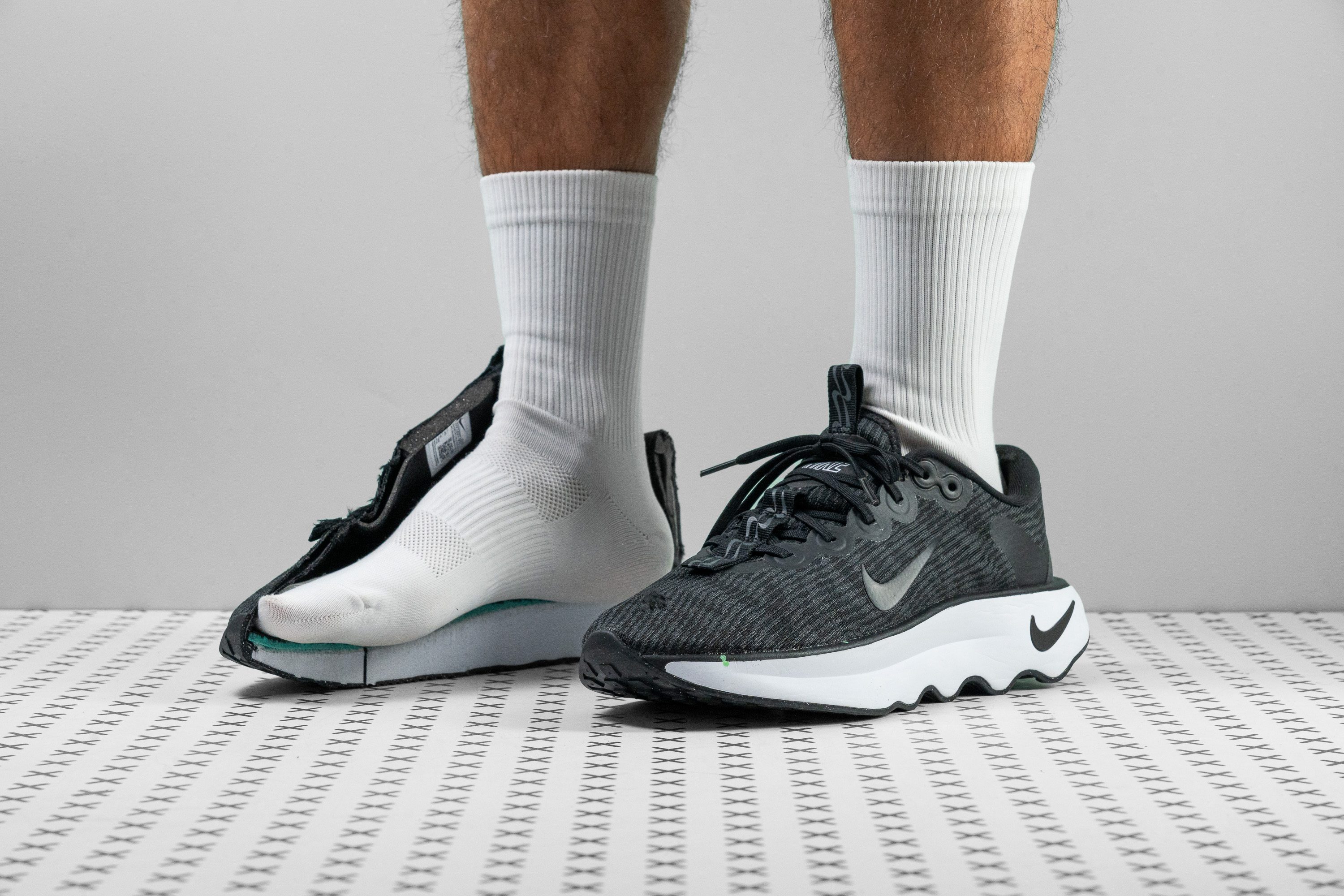
















































What makes it the best?
Our walks with the Nike Motiva were one of a kind with its silky smooth transitions, plush sensation, and wide base. Our lab assessments confirm its stability for walking because its exaggerated rocker encourages forward steps, making it our best women’s walking shoe. Motiva is a powerful motivator for movement while offering exceptional comfort.
We found it hard to stay still because the shoe’s prominent design would bring us from our heels to our toes. Motiva maintains a necessary level of stiffness to maintain its rocker shape, and any attempts to twist it were unsuccessful, which is why we awarded it a 5/5 torsional rigidity score.
Motiva is generously cushioned, with calliper measurements of 34.9/25.6 mm. It feels cloudlike on foot, evidenced by its high 133 SA rating in our shock absorption test, 19.8% softer than average. The platform’s wavy sole also enhances compression, which makes the shoe even more comfortable. We found it highly suitable for women who run errands because it feels great even during long hours on foot.
Motiva features an accommodating platform for wide or swollen feet. At 116.0/96.6 mm, it’s wider than average, which naturally gives a well-planted feeling.
However, the midsole’s plush nature causes the foam to crease almost instantly. While this is only an aesthetic issue, it may be disappointing for some women.
Pros
- Rocker makes for effortless walks
- Audaciously plush cushioning
- Extra lively and bouncy ride
- Out-of-the-box comfort
- Very wide and stable base
- Durable outsole
- Amazing wear resistance in the upper
Cons
- Lacks breathability for hot weather
- Sole develops wrinkles easily
- Rocker takes time to get used to
- Lacks grip on wet surafces
Women's walking shoes with the best shock absorption
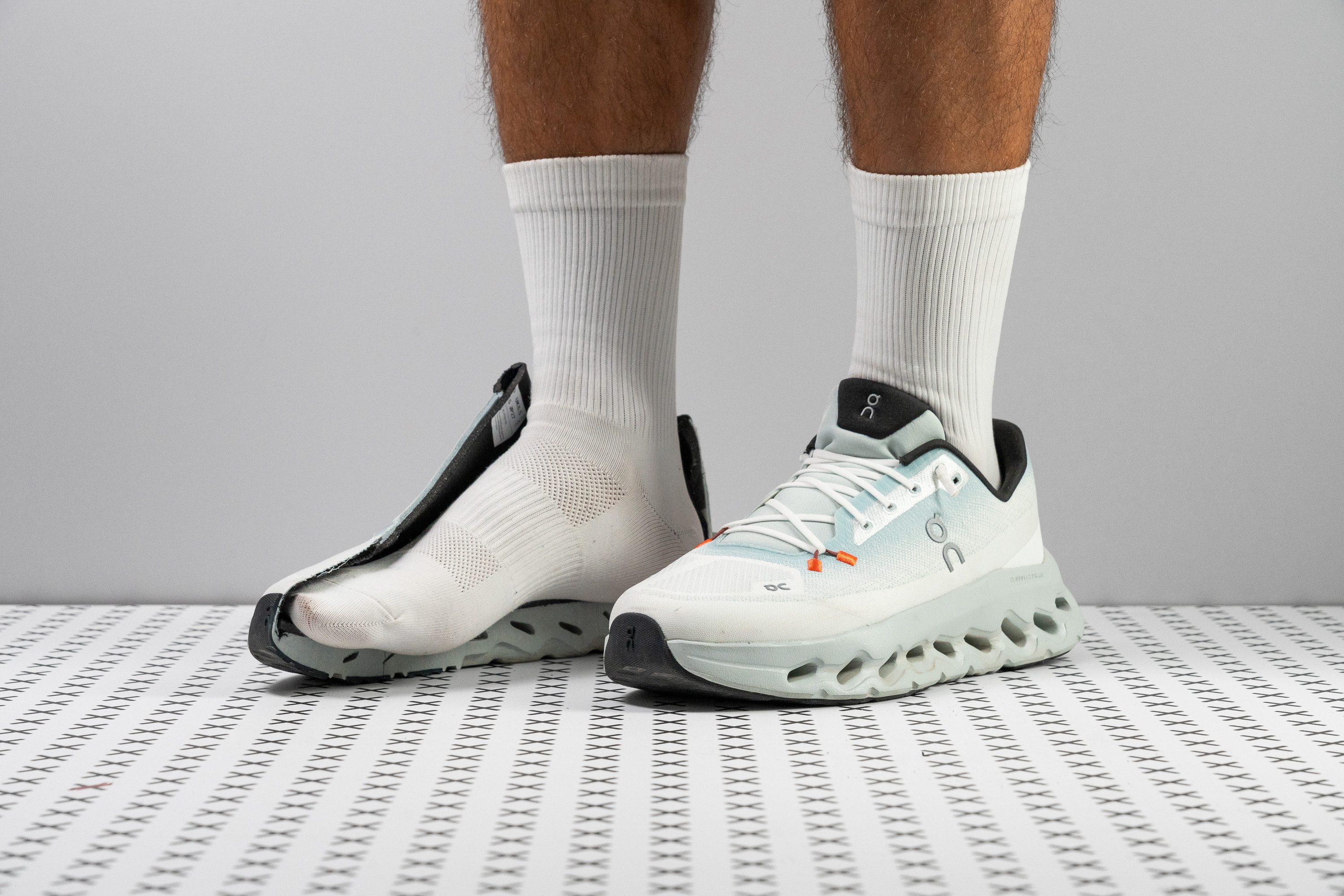

























































What makes it the best?
We found ourselves constantly reaching for the On Cloudtilt in our daily walks because it felt like home. Our lab tests confirm its low weight is packed with cushioning, surefootedness, and bounce that feels effortless. The cosy sensation it brings makes it our top shock-absorbing women’s walking shoe.
The Cloudtilt goes all out on comfort, serving a thick 35.5/26.8 mm foam beneath our feet. The CloudTec compression does wonders for reducing road impact, proven by its 132 SA rating in our shock absorption test. With 18.9% better joint protection, we could achieve thousands of steps with minimal fatigue.
The midsole offers responsiveness that will suit women seeking a dynamic sensation underfoot. It showed a top-tier 58.1% energy return score in our lab test, adding a spring to every step. Despite its height, we felt surefooted thanks to its massive 117.7/96.7 mm platform.
The Cloudtilt has a simple personality, with its minimalist aesthetic easy to style, and its light build easy to manoeuvre. It’s truly easy on the feet at 9.4 oz (266g), 7.6% lighter than average.
However, Cloudtilt's generous cushion made it stiffer than the standard. Women who want more adaptability should go for more flexible shoes.
Pros
- Plenty of cushioning for long hours on feet
- Soft yet bouncy ride
- Feels nice and light on foot
- Abrasion-resistant upper and outsole
- Wide and steady platform
- Excellent outsole grip
- Easy on-and-off with bungee laces
- Upper made of recycled material
Cons
- Not very breathable
- Flimsy inner lining and insole
- Not for wide feet
Best city-to-trail walking shoes
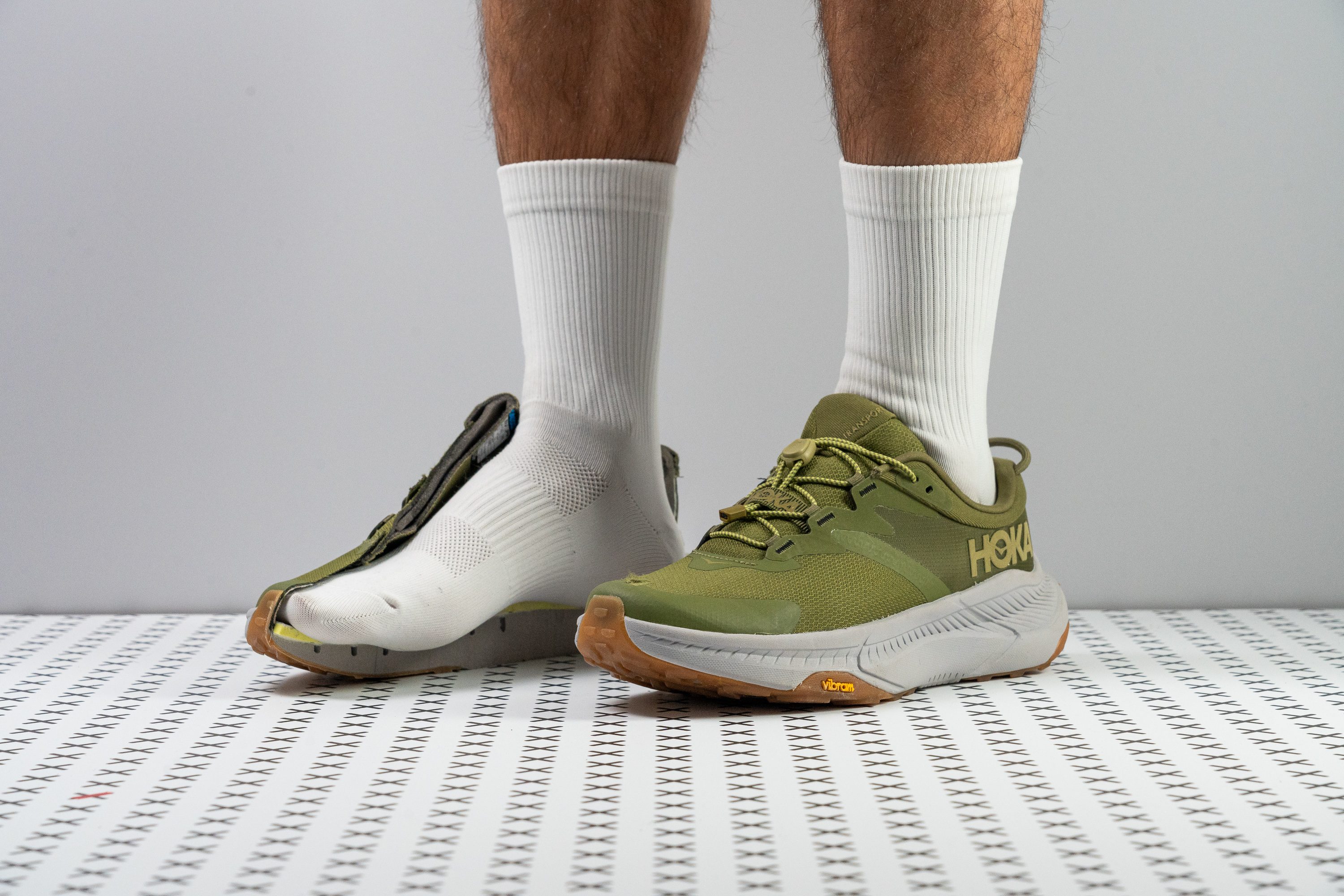










































What makes it the best?
We found the Hoka Transport highly suitable for busy and on-the-go women because it feels nice and steady in our walks. It’s easy to forget about the shoe and focus on our tasks at hand because we feel secure and well-protected, which is why it’s our top city-to-trail women’s walking shoe. Our lab tests show it even has a durable outsole to boast!
The planted sensation of the Transport stems from its broad base and stiff construction. Our calliper measured it to be a wider-than-average 112.8/92.5 mm. This extra width gives us more room to find our footing securely and allows space for our feet to swell. It also doesn’t give in to twists easily and pushes us forward through its rocker geometry.
The cushioning feels delightful and supportive, giving women the comfort they need for work, light treks, or commuting. With 34.1/26.1 mm of foam beneath our feet, we have more impact protection than the 32.3/21.9 mm average. It’s very gentle to the touch, evidenced by its 116 SA rating in our shock absorption test.
Meanwhile, the outsole features the reliable Vibram rubber, making it reliable on various surfaces. Checking further in the lab, we found it harder (81.9 HC) and thicker (3.7 mm) than average, cementing its capability of being a daily beater.
However, it’s not a very breathable shoe, so it’s not ideal for women who live in tropical cities.
Pros
- Well-cushioned for all-day wear
- Spacious toe box
- Superior traction
- Reliable outsole durability
- Easy to slip in and out
- True-to-size fit
- Easy to clean
- Sustainable
- Sustainable
Cons
- Not great for warm weather
- Squeaky during break-in
Women's walking shoes with the best arch support
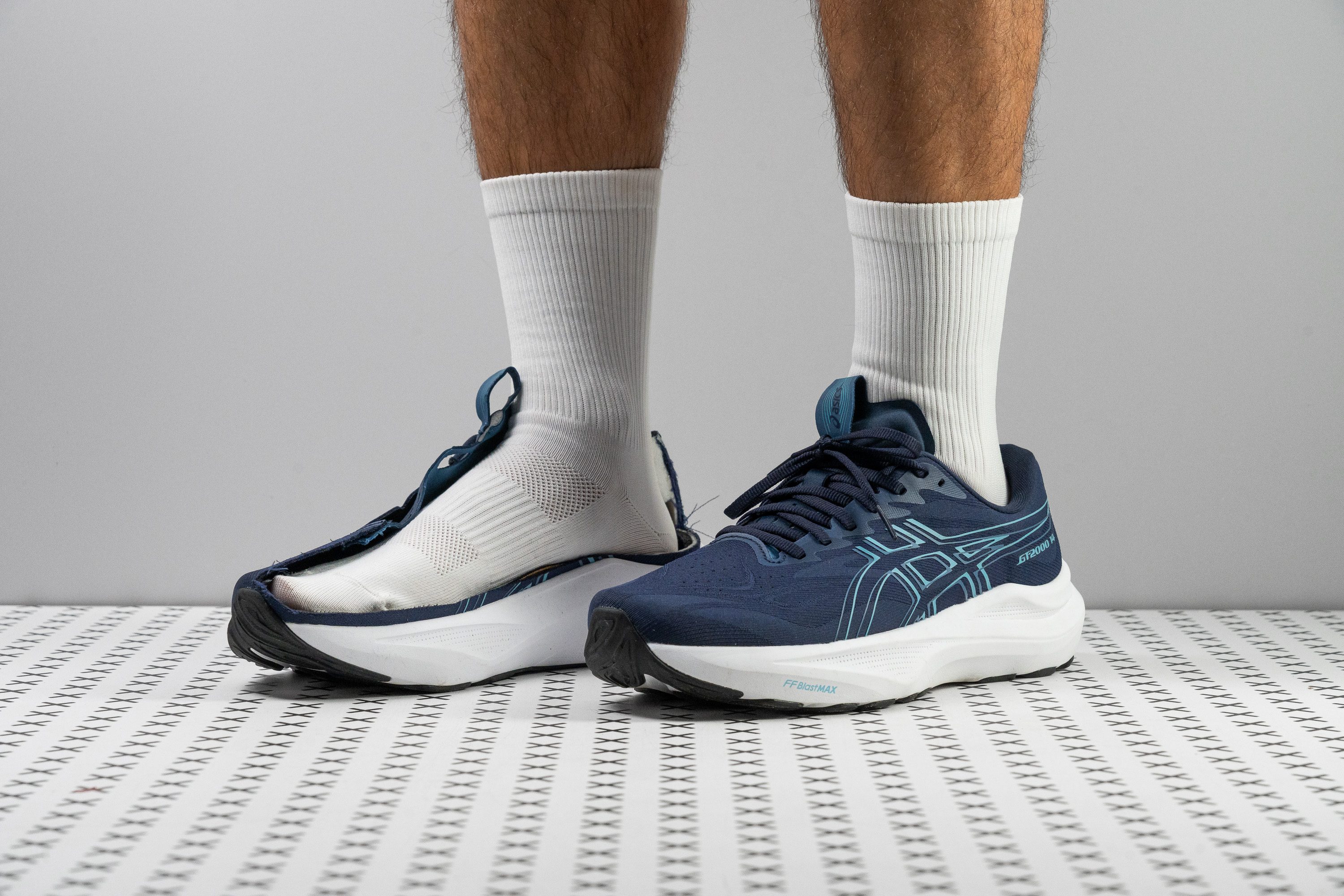
















































What makes it the best?
Our feet truly loved our walks with the ASICS GT 2000 14. It offers the most amazing arch support among women’s walking shoes, which allows us to be on foot for hours on end. Our lab agrees it’s highly supportive even for those with overpronation or other foot conditions because of its delightfully cushioned yet stable base.
GT 2000 14 delivers a confident footing through its 3D Guidance System, which includes high sidewalls in the midfoot and a broad base to reduce spillovers and ankle twists. Our calliper verifies it is indeed wide at 117.6/97.1 mm. In our manual twist test, it fought back firmly, so we awarded it a high 4/5 rating, which makes it suitable for women seeking a sure-footed ride.
We measured the stack at 36.9/28.2 mm, which makes the ground feel more bearable and reduces pressure on our joints and muscles. Moreover, we recorded a high shock absorption of 132 SA, making the foam 18.9% more protective than the average walking shoe.
Note that the shoe offers limited airflow. Women who want to avoid dealing with overheating and sweaty feet should skip this pair.
Pros
- Improved FF Blast Max foam
- Outstanding outsole durability
- Stable design without feeling intrusive
- Reasonable weight
- Same price maintained despite upgrades
- Well-crafted, supportive upper
- New outsole design improves flexibility
- Dependable traction
- Dependable traction
Cons
- Limited breathability
- Tapered toebox may feel restrictive
- Still lacks a truly energetic ride
- PureGEL doesn't add much value
Best women's walking shoes for travel
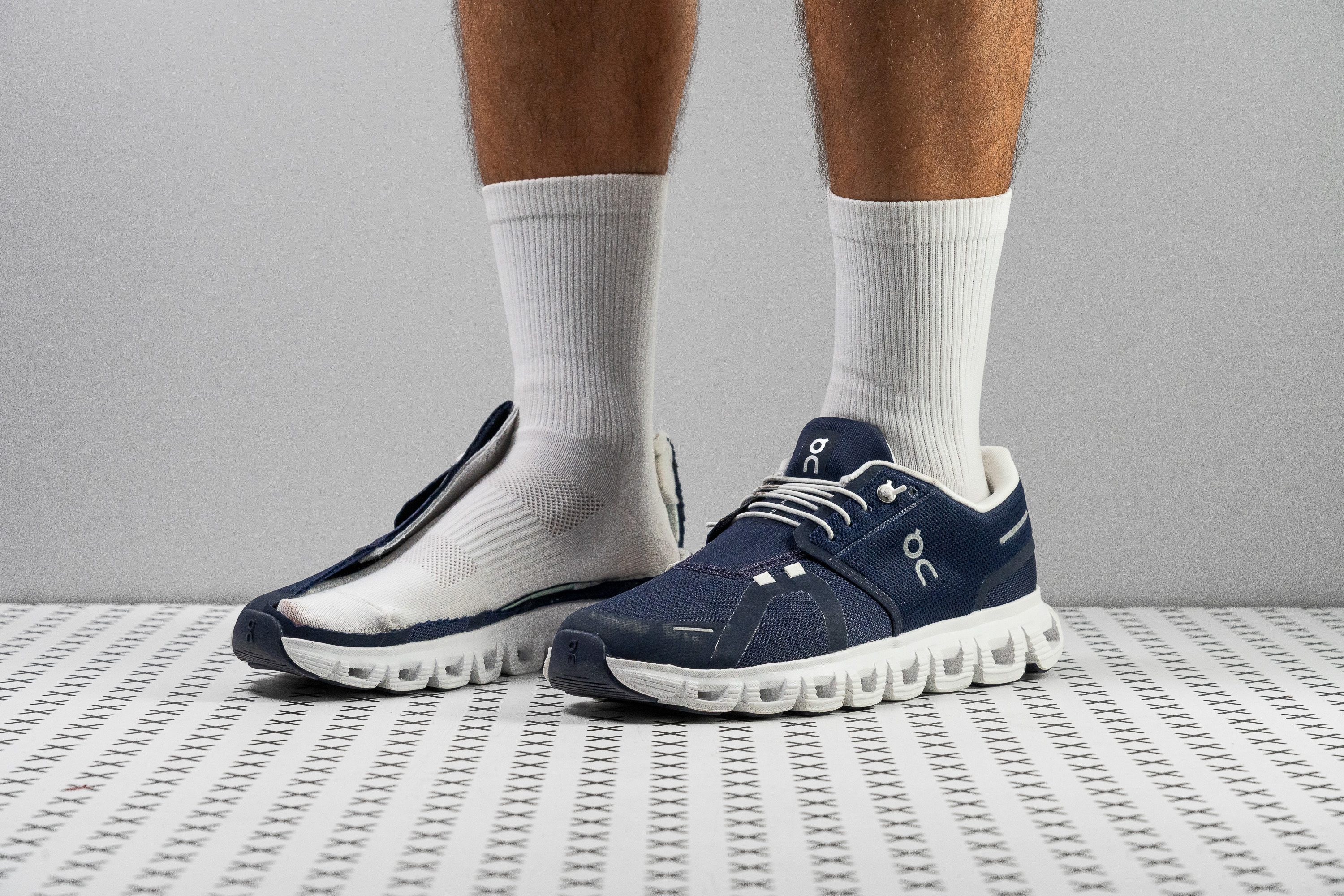














































What makes it the best?
The On Cloud 6 satisfied our wanderlust hearts as we freely explored new places with its weightless and forgiving ride. Our lab tests validate our sentiments by proving it’s a light, flexible, and stable shoe, making it highly versatile for various activities. It feels supportive without the burden of extra pounds, making it our best travel walking shoe for women.
The Cloud 6 feels good on foot with its low weight, perfect for female backpackers who want to travel light. Our scales reveal it’s only 9.7 oz (274g), 4.9% lighter than the average walking shoe.
It has grooves in the outsole that improve its flexibility. Bending our feet during walks feels effortless, adding to its weightlessness. Our bend test confirms it’s 7.9% more pliable than average.
A great travel shoe requires exceptional stability, and the Cloud 6 delivers that through its grounded base. With its low 106 SA score in our shock absorption test, we have high surface feedback, which enhances our surefootedness. The stack height also falls below average at 28.3/19.5 mm.
However, women seeking plush cushioning won’t find that kind of comfort here. Cloud 6 is a minimalist, so other shoes may offer better joint protection.
Pros
- Smooth heel-to-toe transitions
- True to size and width
- Great traction on wet and dry
- Flexible construction
- A bit lighter than average
- Breathable for warm weather
- Promising outsole durability
- Slip-on design with easy on-and-off
Cons
- Steep price hike with minimal changes from the v5
- Not for all-day wear
- Not very supportive
- Upper lacks wear resistance
Best slip-resistant walking shoes for women
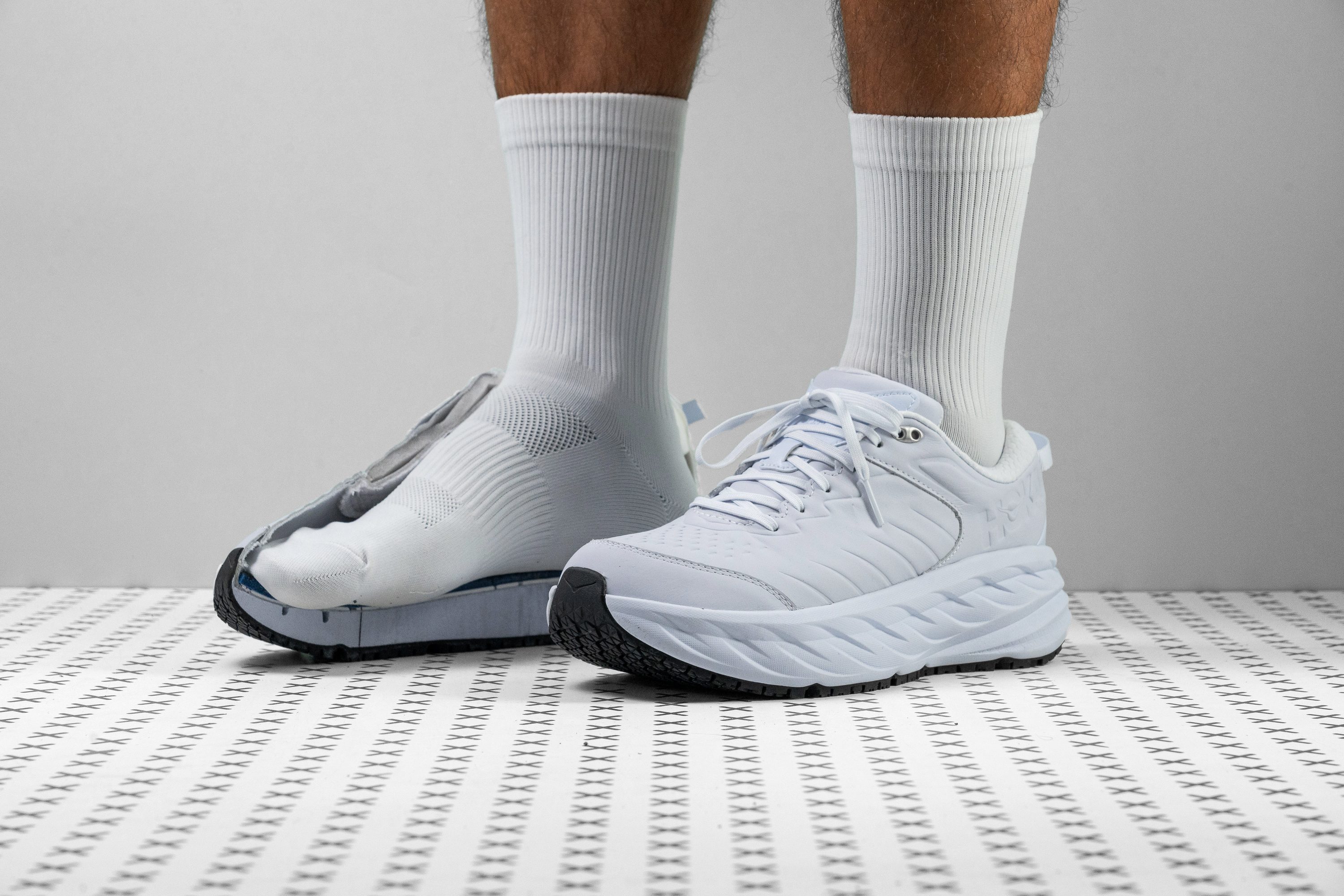










































What makes it the best?
We discovered Hoka Bondi SR’s strong bite on wet floors during our walks, making it our best slip-resistant walking shoe for women. Our lab tests reveal it has a cushioned yet surefooted base, perfect for standing all day. Whether walking through snow or dealing with wet kitchen tiles at work, Bondi SR kept us safe and confident.
We couldn’t wait to countercheck in the lab the tacky grip we experienced. In our wet-condition test, it impressed with a high coefficient of 0.77, which means it offers grip 67.4% stronger than average. The shoe also has a massive base to keep us surefooted, and therefore, more outsole rubber with ground contact. Our calliper shows it’s one of the widest we’ve seen at 124.1/102.2 mm.
The shoe also feels stiff to maintain its rocker shape, perfect for women who enjoy smooth transitions. It felt impossible for our ankles to collapse because we couldn’t twist the shoe, earning the highest 5/5 torsional rigidity.
Comfort is evident in the shoe’s tall 39.4/31.2 mm stack height. Impact protection is undeniable with its bottomless cushioning with its plushness further elevated by the 20.4 HA foam, 21.8% softer than average per our durometer.
Unfortunately, what Bondi SR gives in grip, it lacks in terms of durability, as our Dremel wreaked havoc on the outsole. Women who need hard-wearing outsoles should check alternatives.
Pros
- Comfort is off-the-charts
- Extra thick cushioning for all-day support
- Smooth heel-to-toe transitions
- Alleviates foot discomfort (podiatrist approved)
- Stable for a neutral shoe
- Truly slip-resistant outsole
- Superior material quality
- Water-resistant leather upper
- Accommodating toebox
Cons
- Heavy and bulky
- Not breathable
Best budget walking shoes for women
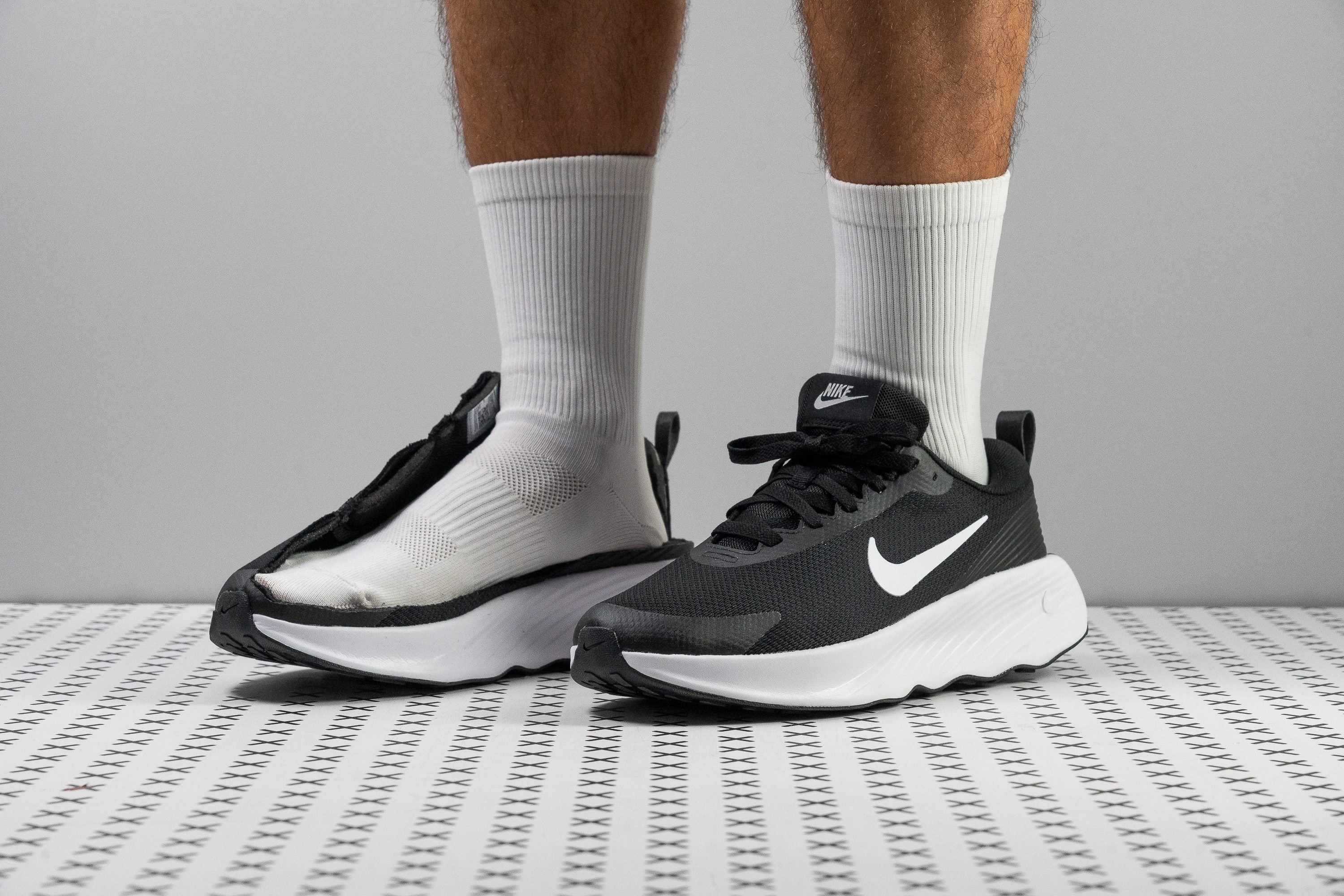













































What makes it the best?
The Nike Promina offers a refreshing ride with its unique construction, uber-smooth transitions, and ergonomic set-up, as we’ve seen in the lab. We found it hard to stay still in its springy cushion that encourages forward movement, offering an effortless experience. What’s amazing is how this shoe only costs £70, making it our best budget women’s walking shoe.
With a cost that is 45.4% below the average walking shoe, Promina delivers lasting comfort through its generous cushioning. We measured it with our calliper at an above-average 36.0/25.3 mm, while our shock absorption test shows a good score of 111 SA.
It has a pleasant blend of responsiveness and flexibility, balancing out a fun and easy ride. We measured its energy return in the heel at 55.8%, offering a touch of spring in our steps. Meanwhile, it is 5.0% more pliable than average in our bend test.
The Promina features a grooved rocker effortlessly bringing us from our heels to our toes. This setup is perfect for women who want to wear and forget about the shoe, as it’s easy to stroll mindlessly.
However, we had to mind our steps on extra slippery surfaces since this is where we lost our footing. Women who often deal with wet tiles or dusty floors should find a grippier shoe.
Pros
- Solid value for money
- Great shock absorption for all-day wear
- Grooved rocker makes heel-to-toes smooth
- Excellent outsole durability for the price
- Good outsole traction
- Moderate lateral stability
- Breathable for summer
- Contains sustainable materials
Cons
- Upper lacks durability
- Firm-feeling ride
- Snug fit
How women’s walking shoes are different from men’s
This may sound harsh but most major athletic shoe brands use the following approach to gender-based footwear: women’s shoes are simply scaled-down men’s shoes. But is it necessarily a bad thing?
Considering how different individual foot shapes are, even within the same gender, making a shoe that would feel tailor-made for everyone is a challenge. Nuances like foot arch type, instep height, forefoot width, toe length, deformities like bunions, and many other parameters affect footwear choice way more than gender.
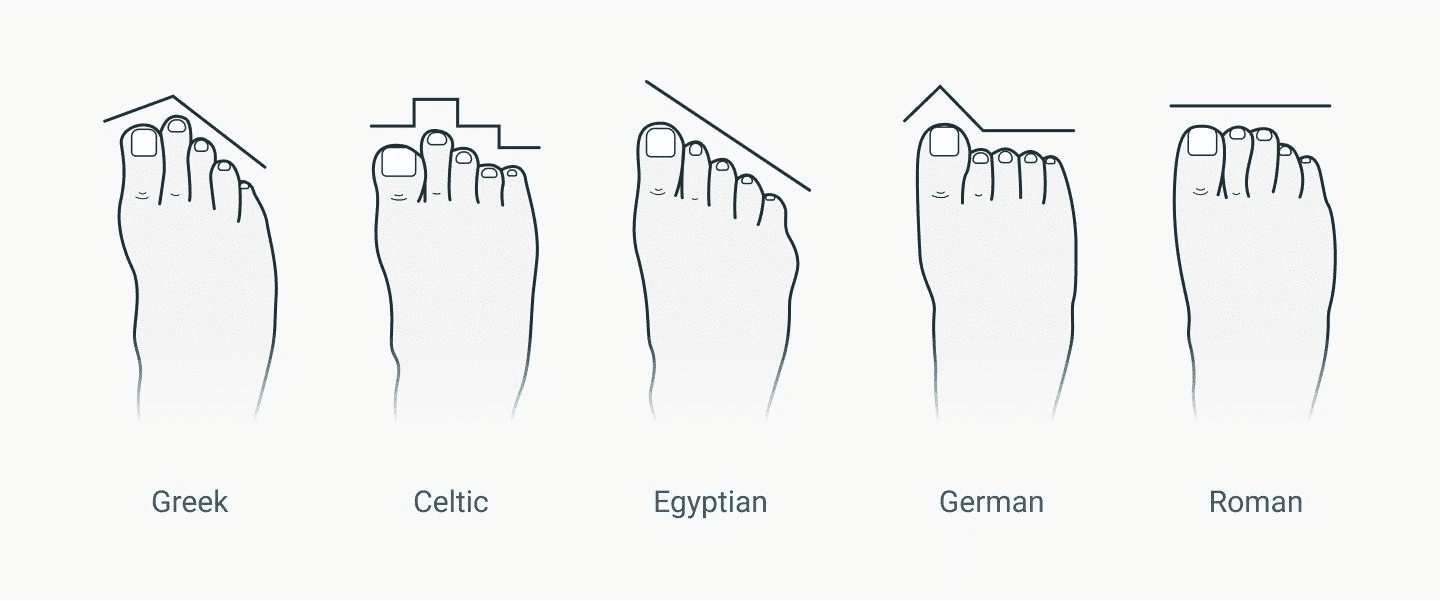
That’s why we are a bit sceptical when some brands claim their shoes to be designed “specifically for a woman’s unique foot shape.” We are not saying that this is a false statement but a few scientific studies proving that statement would make us more convinced.
So what are the actual differences between men’s and women’s walking shoes?
- Size
- Width
- Colorways
Size
Say you are a lady who measured her foot length and found that a shoe length of 250 mm (25 cm) fits her best. If you check most brand size charts, you will find that 250 mm equals a women’s US size 8 and a men’s US size 6.5 (or US 7 in some brands).
|
Shoe length (MM) |
Women’s US size |
Men’s US size |
|
250 |
8 |
6.5 |
You can also see this difference in unisex walking shoes where the brands use the following size number format:
|
M 6.5 / W 8 |
M stands for men’s size and W is for women’s
Width
A standard medium width for women is marked with the letter B, whereas for men, it is marked as D.
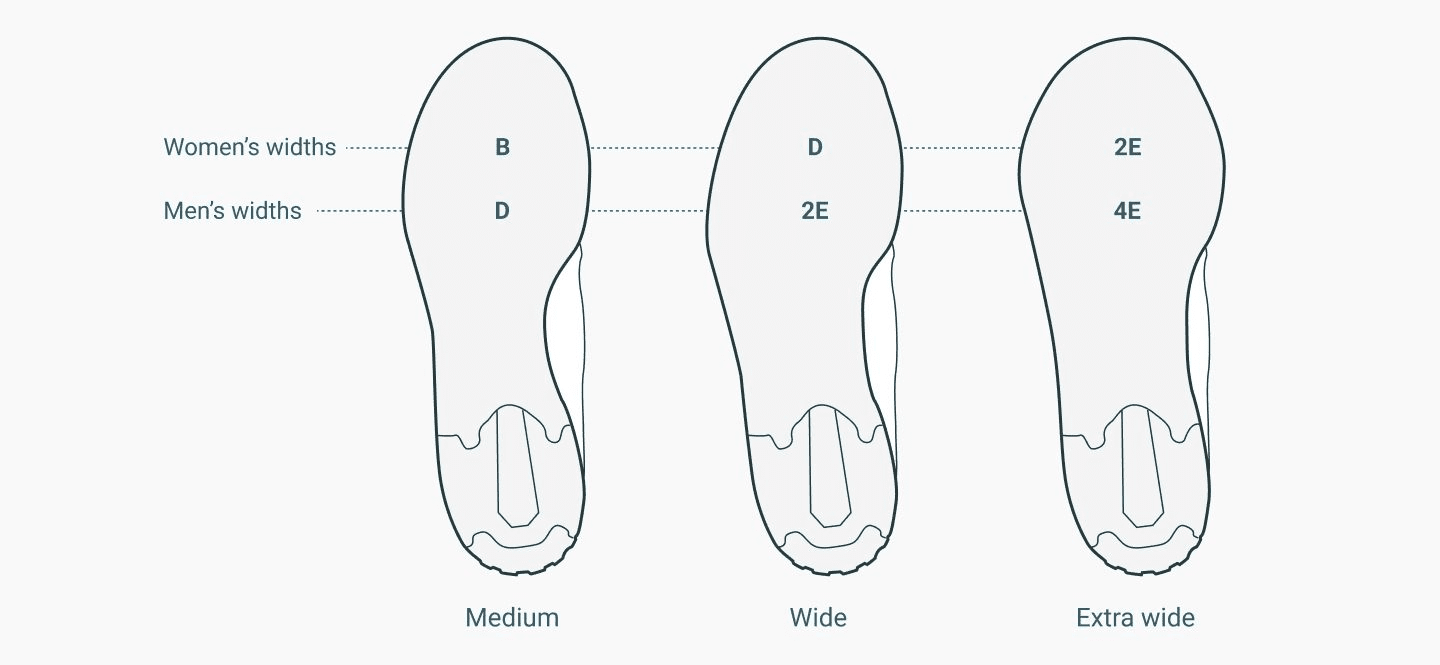
The rest of the shoe widths go as follows:
|
Men |
Width |
Women |
|
- |
4A |
Extra Narrow |
|
Extra Narrow |
2A |
Narrow |
|
Narrow |
B |
Standard |
|
Standard |
D |
Wide |
|
Wide |
2E |
Extra Wide |
|
Extra Wide |
4E |
Extra Wide |
|
Extra Wide |
6E |
- |
Does this mean that a women’s D-width shoe will be just as wide as a men’s D-width? It depends on the brand but most likely, they will be different.
As we can see from the size and width charts provided by New Balance and Hoka, the approach to gender-based width varies a lot:
| New Balance | |||
|
Shoe length |
Size |
B width |
D width |
|
250 mm |
women’s US 8 |
88 mm (standard) |
92 mm (wide) |
|
250 mm |
men’s US 6.5 |
96 mm (narrow) |
99 mm (standard)* |
*men's D width is still 7 mm wider than the women's D width
| Hoka | |||
|
Shoe length |
Size |
B width |
D width |
|
250 mm |
women’s US 8 |
93 mm (standard) |
99 mm (wide) |
|
250 mm |
men’s US 7 |
n/a (narrow) |
96 mm (standard)* |
*only a 3 mm difference in men’s and women’s D width
In this section, we show our lab tests that accurately measure the width of the toebox, the width of the shoe, and the toebox height!
Colorways
This one is pretty self-explanatory. Yes, nearly every walking shoe for women will have a pink colorway but we are also happy to see a wider range of both vivid and soft, subdued colour options.
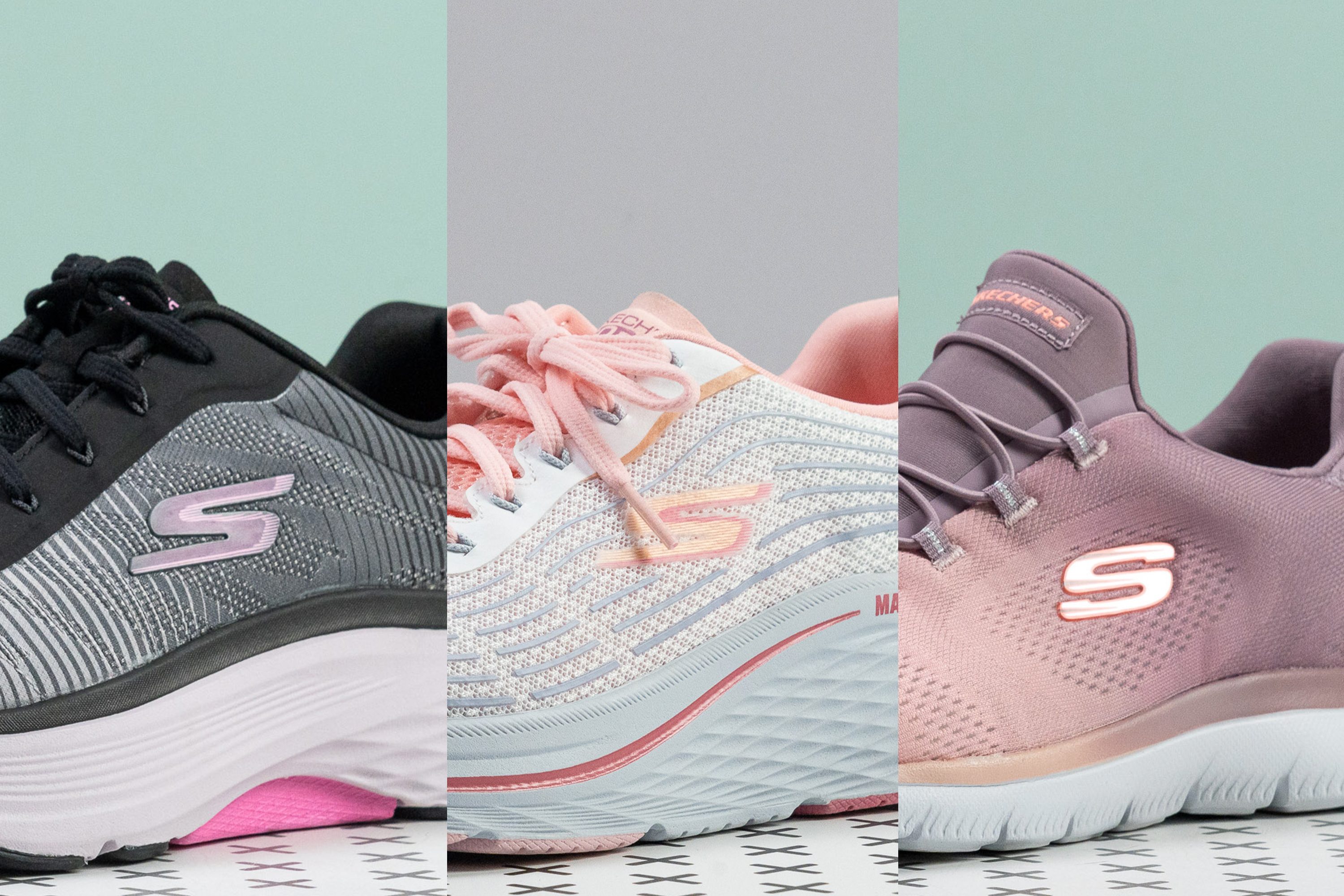
Choosing the best walking shoes for women
Let’s get some shoes!
Ladies, admit it, we are all drawn to the most visually appealing shoe at first. And the unfortunate truth is that 60% of women in the US are willing to continue wearing uncomfortable shoes for fashion.
But if you want to change things up in your next pair of walking shoes, please do consider the following important factors in addition to the shoe’s visual aspect:
- Use: Think of the context where you will be wearing shoes most of the time. Is it for daily chores, closing exercise rings on your fitness tracker, exploring new places, or working?
- Health conditions: Did you receive any footwear recommendations from your doctor? Or perhaps you need a more supportive shoe to manage flat feet and overpronation?
- Surface: Do you need a more wear-resistant shoe for concrete and cobblestone? Or a slip-resistant outsole to stay surefooted on wet tiles?
- Season: How warm or breathable should it be?
Women’s shoes for walking and standing all day
Whether running errands, grocery shopping, or chasing your kids, you need a well-cushioned pair of walking shoes to get you through the day. Why? Having enough midsole foam provides the necessary impact protection for your feet and legs and lowers the toll on the body overall.
We are dead serious about shock absorption in shoes and follow a scientifically acclaimed protocol method for measuring it precisely in our lab.
We recommend choosing shoes with a shock absorption measurement of at least 110 SA for guaranteed underfoot comfort.
Many people think that a cushioned shoe must always be plush, but that’s not true. You can feel sufficiently cushioned with a firmer midsole, too. In fact, the latter is often recommended to alleviate some foot conditions (we’ll cover that in detail below).
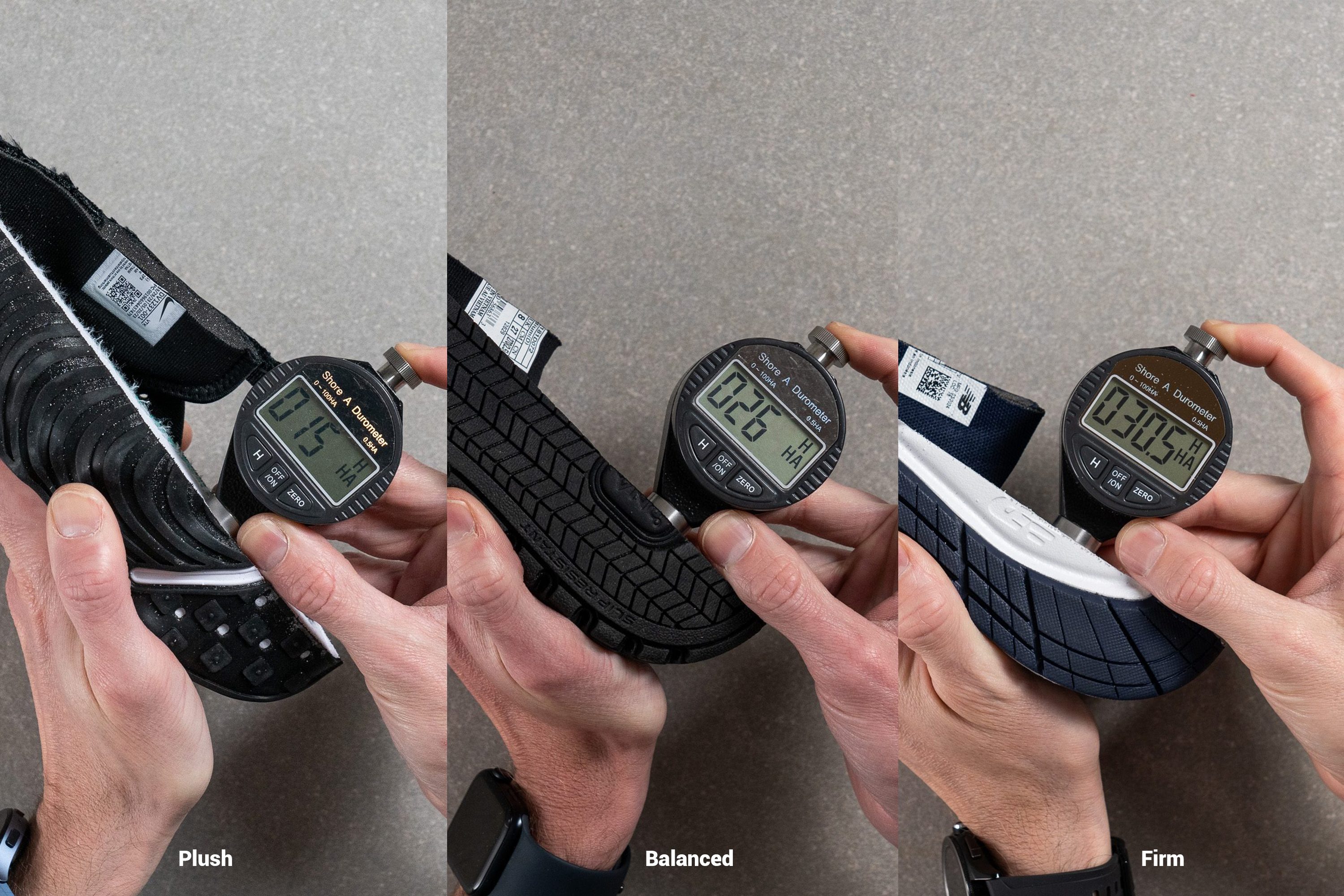
We use a Shore A durometer to measure the midsole softness of each shoe. The lower the HA reading, the softer the foam.
Cushioning softness is a matter of personal preference, and you may opt for any softness level you like:
- plush (20 HA or less)
- balanced (20 - 30 HA)
- firm (30 HA or more)
Women’s walking shoes for staying fit
In its guidelines on physical activity and sedentary behaviour, the World Health Organisation recommends that adults do at least 150-300 minutes of moderate-intensity aerobic physical activity per week.
Well, walking at a brisk pace (at least 2.5 mph) is one of the most accessible activities to reach that goal. You might as well mix some jogging into the equation for additional cardio health benefits. And the only equipment you need for this fitness exercise is a pair of good athletic shoes.
That’s where we recommend investing in a solid daily running shoe. Positioned as both walking and running footwear, this category is loaded with the best cushioning practises that the brands develop for their performance running shoes. They provide the best impact protection and energy return to make your longest walks and runs highly enjoyable. Not to mention that they make for super comfortable daily beaters too.
NOTE: The higher the SA, the more impact protection you get. The higher the energy return (%), the springier the ride.
Travel walking shoes for women
Footwear should be the least of your worries when travelling and exploring new places. If you want to feel equally comfortable on a 9-hour plane ride and a 5-hour tour around a European castle, you should look for the following shoe features:
- Lightness: Not being weighed down by your shoes is a nice feeling, especially if you need to pack them into a suitcase.
- Cushioning: We recommend shock absorption of at least 100 SA for sufficient impact protection.
- Breathability: Unless you’re travelling in rain and snow, it’s best to have a well-ventilated shoe on to avoid sweating and unpleasant odour.
- Easy on-and-off: Not necessary, but can come in handy at the airport.
*Weight is presented for a men's US 9, which is equivalent to women’s US size 10 or 10.5.
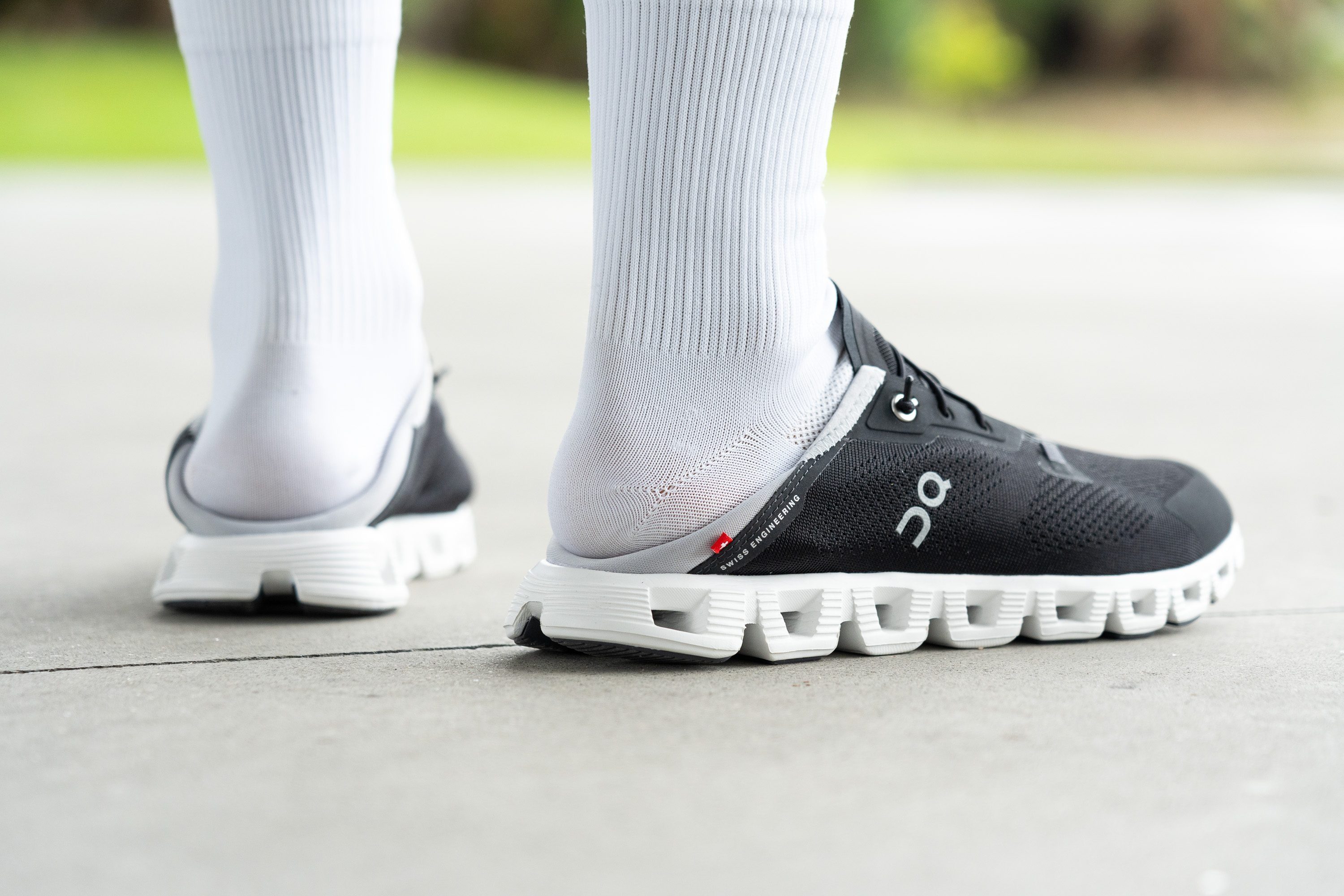
Specialised work shoes for women
Fields like healthcare, food industry, factory work, delivery, and other demanding professions can require women to spend very long hours on their feet. In this case, proper footwear becomes essential for minimising both short- and long-term effects of prolonged walking and standing on your body.
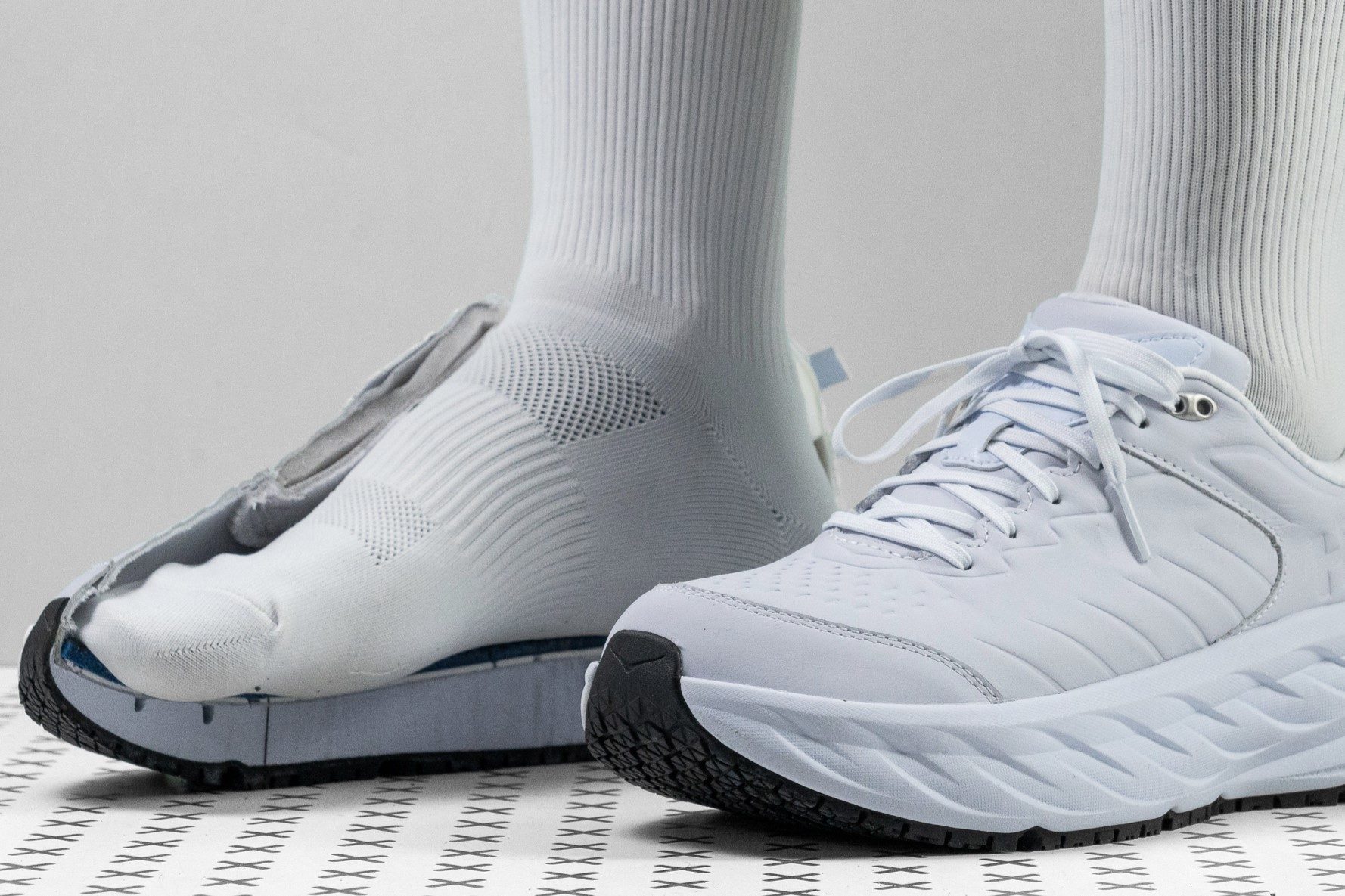
Here are the must-have features of a solid work shoe for women:
- Cushioning: Shock absorption of at least 100 SA.
- Support: High torsional rigidity (hard to twist the shoe), stiff heel counter (holds the foot in place), and wide platform.
- Special features: Depending on your work environment, a slip-resistant outsole or a leather upper may be required.
- Formal style and monochromatic colours to match your workplace uniform.
Women’s walking shoes for various foot conditions
This guide has an informational purpose and is not meant as medical advice. Please consult a doctor about any foot health concerns before purchasing your next pair of walking shoes.
A good walking shoe should contribute to your well-being or, at least, not interfere with it. In this section, we look at the most common foot conditions and the shoe features that help to relieve them.
Stability women’s shoes for flat feet and overpronation
“Best walking shoes for flat feet” is one of the most common web searches among foot-related conditions.
Ladies with flat, or fallen, foot arches often complain about the lack of arch support on the inner side of their shoes. This is usually accompanied by inwardly collapsed ankles as well (overpronation), which causes your shoes to wear out much faster on the inner side.
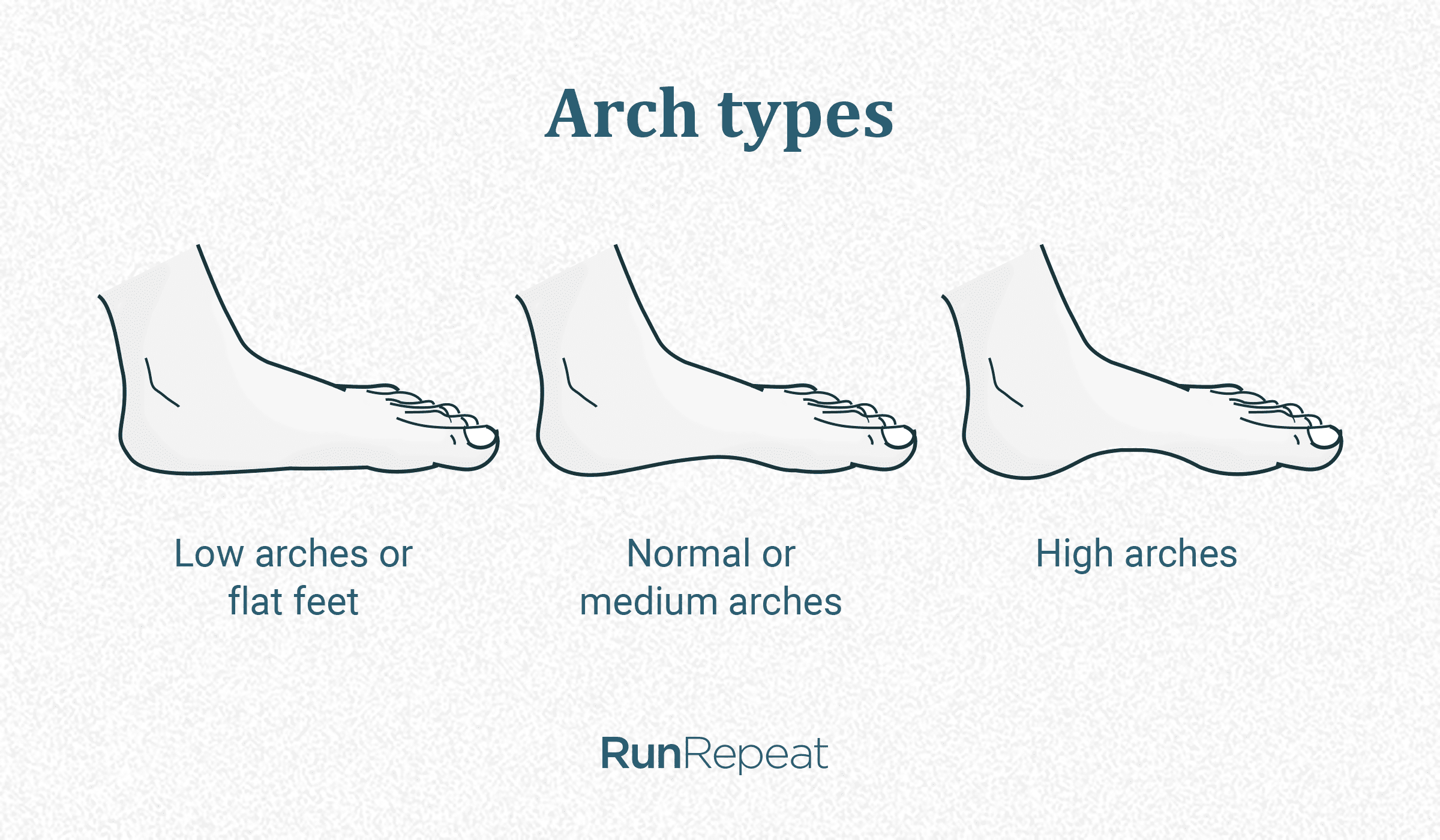
But can you determine your arch and pronation type correctly on your own? This study shows that only about 49% of runners were able to determine their type correctly. That’s why we strongly recommend that you have your feet assessed by a professional.
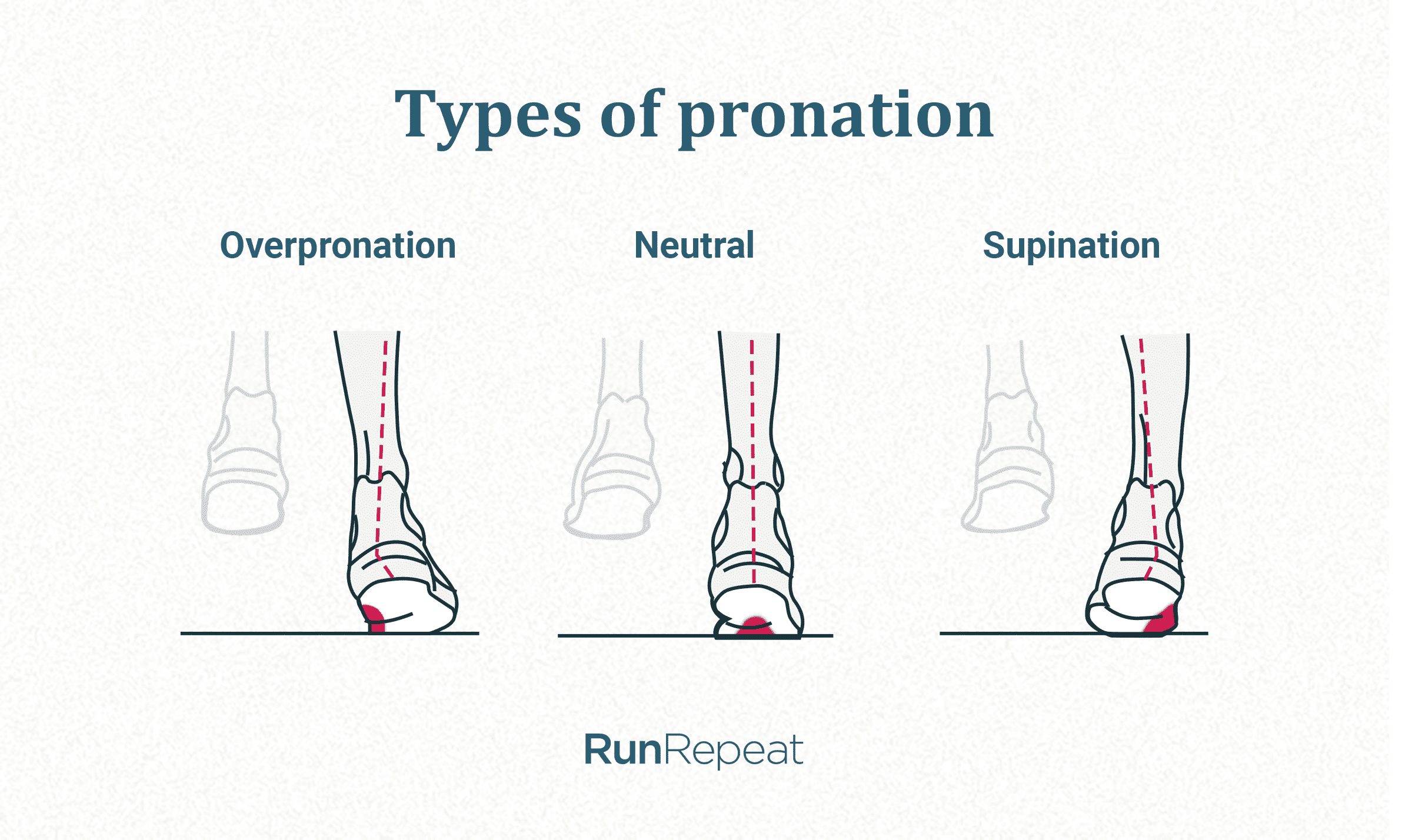
Once you have a confirmed case of flat feet and/or overpronation, your doctor will most likely recommend a stability type of walking shoe. This category has a more rigid and supportive construction that prevents the foot from rolling inwards.
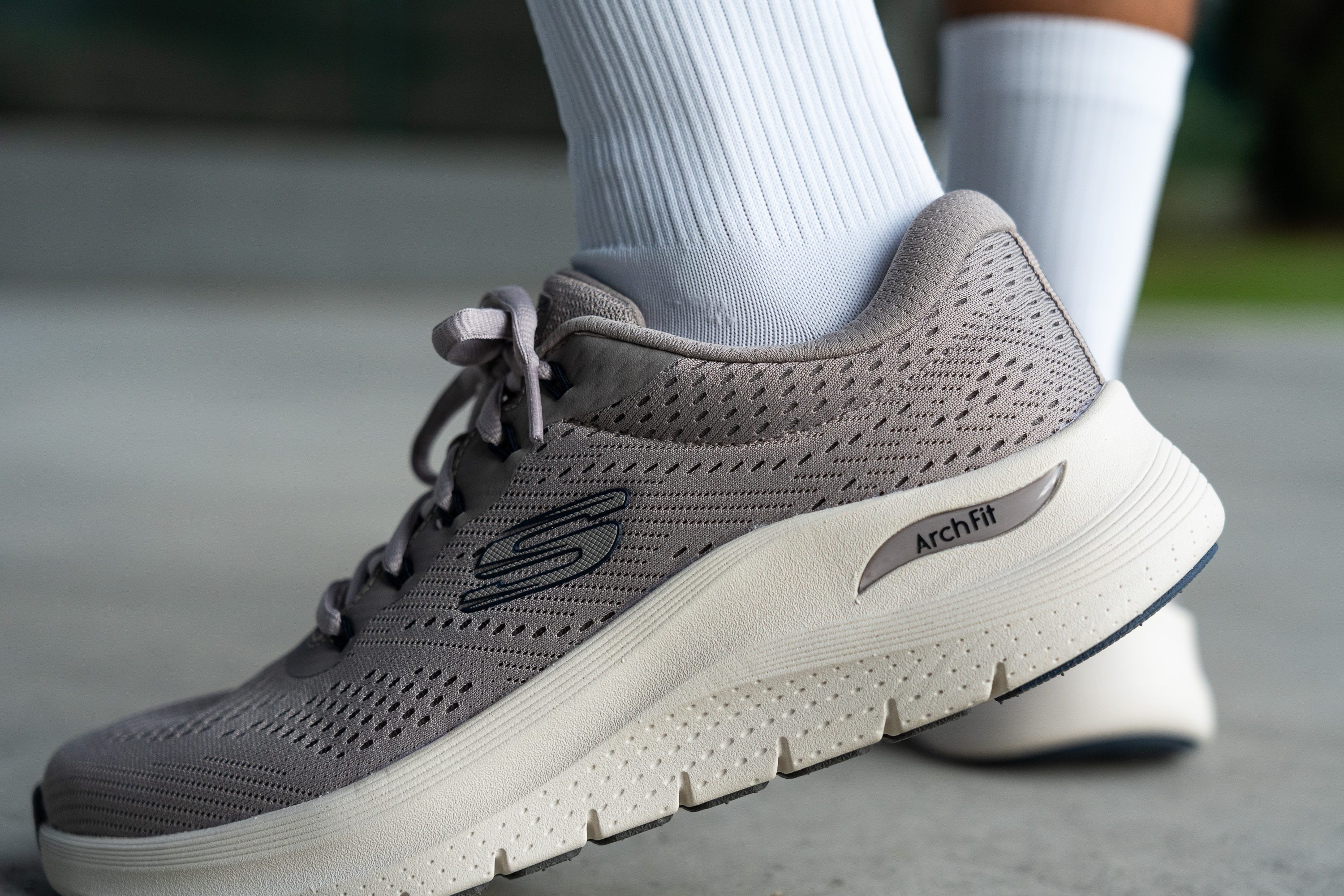
Here are the key features that make these shoes different from neutral walking shoes:
- High torsional rigidity: These shoes are hard to twist, providing solid side support.
- Secure heel hold: A stiff, structured, and padded heel counter keeps the heel and ankle in place.
- Wide platform: Creates a stable landing platform and prevents the foot from rolling over the edge.
What type of walking shoes relieve plantar fasciitis
There can be many reasons for heel pain and it is best if a doctor confirms that you have a case of plantar fasciitis. But there are a few surefire symptoms of this unpleasant condition:
- the heel pain is especially severe in the morning or after rest
- the pain gets worse with weight-bearing
- the pain might echo in the midfoot
- it hurts to palpate the plantar fascia
- discomfort occurs when you bend your big toe by hand
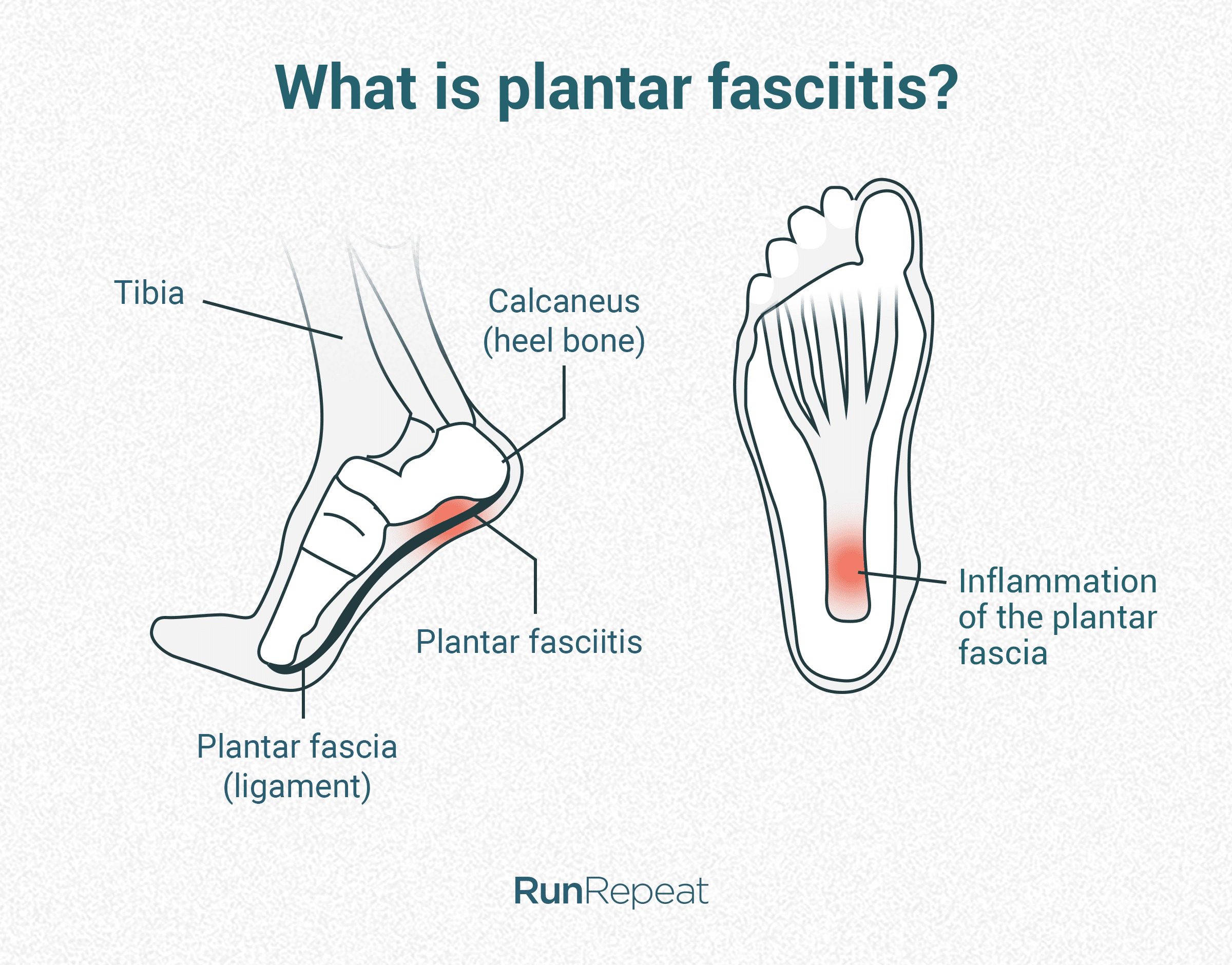
Now let’s take a look at the type of walking shoes that can help ladies with plantar fasciitis feel better:
- high torsional rigidity: stiff and hard-to-twist shoes minimise foot wobbling
- stiff heel counter: prevents heel and ankle shifting inside the shoe
- sufficient cushioning: at least 30 mm of heel stack prevents aggravation
- moderately firm cushioning: prevents excessive foot motion
- higher heel-to-toe drop: at least 8 mm of heel elevation puts less strain on the foot
- wide platform: contributes to stability
That’s a lot of points to check! But luckily, every acclaimed footwear brand has at least some (or many) women’s walking shoes that meet all these criteria.
Women’s shoes that accommodate bunions
Whether you have already developed a visible hallux valgus deformity or the bump formation is still in the beginning stage, you must consider a better-fitting walking shoe to (hopefully) prevent the condition from worsening.

Here is what you should look for above all else:
Accommodating toebox: there should be no pressure, tightness, or pinching anywhere in the forefoot or around the toes. Even in the same size, walking shoes can have vastly different toebox shapes.
This doesn’t always mean that you should get an extra wide shoe option, but it should provide enough room for your toes to splay, swell, and remain comfortable for hours of walking. You can always consult our lab data to see how wide a toebox is.
Once the gel has hardened, we measure the width of the shoe and the width of the toebox.
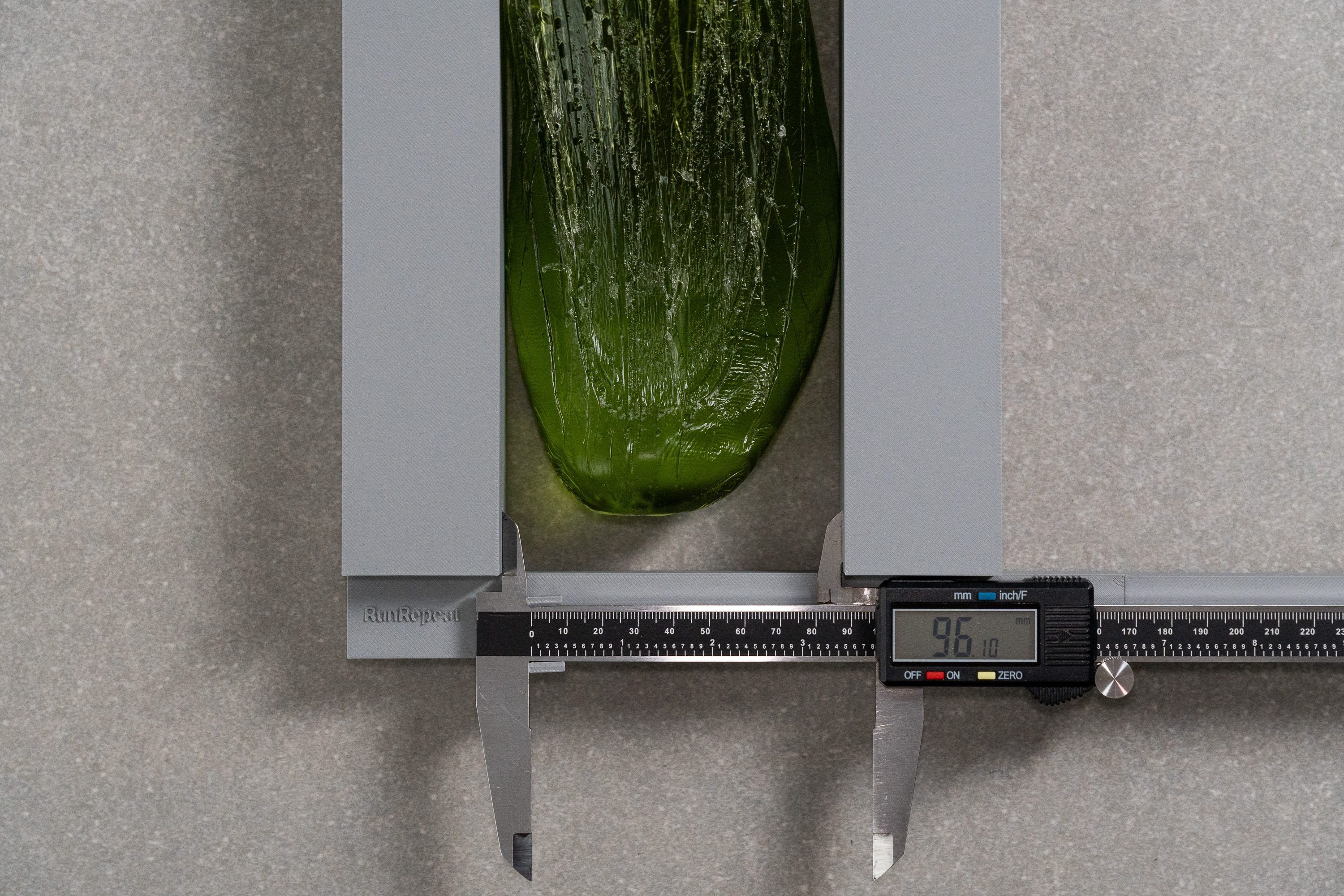
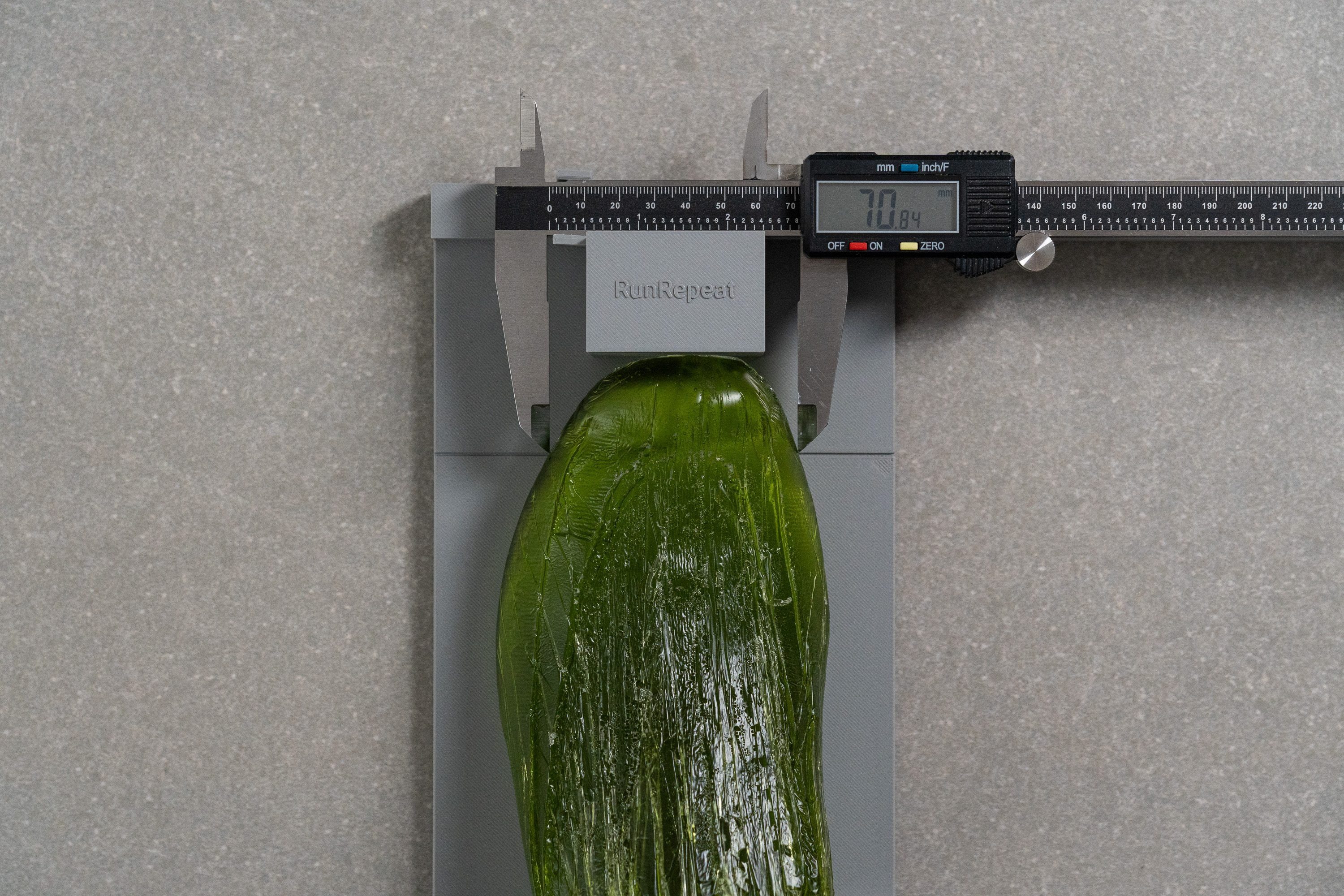
In some cases, the big toe is pushed towards the other toes so much that the toes overlap. So, it's not just the horizontal space that you need, but the vertical one as well!
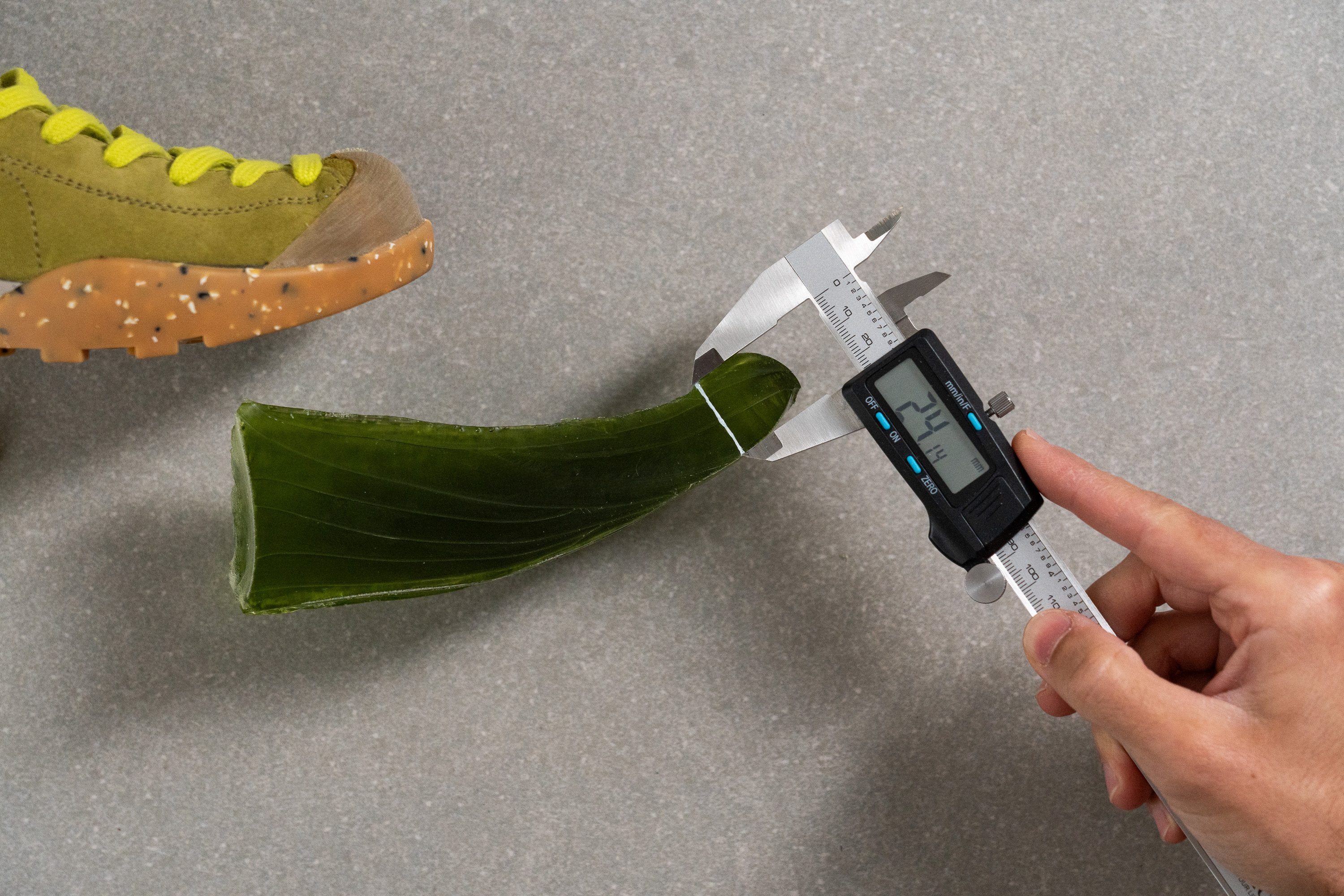
Stretchy upper fabric: choose knit or knit-mesh uppers that stretch and take the shape of your foot easily, without pressure.
In this research, shoes with stretchable upper fabric showed even better results than shoes with a rounded toebox shape. The former significantly reduced pressure on the toes and was reported as more comfortable for people with bunions (hallux abducto valgus).
Pregnancy and walking shoes: recommendations
Pregnancy is always accompanied by weight gain and foot swelling.
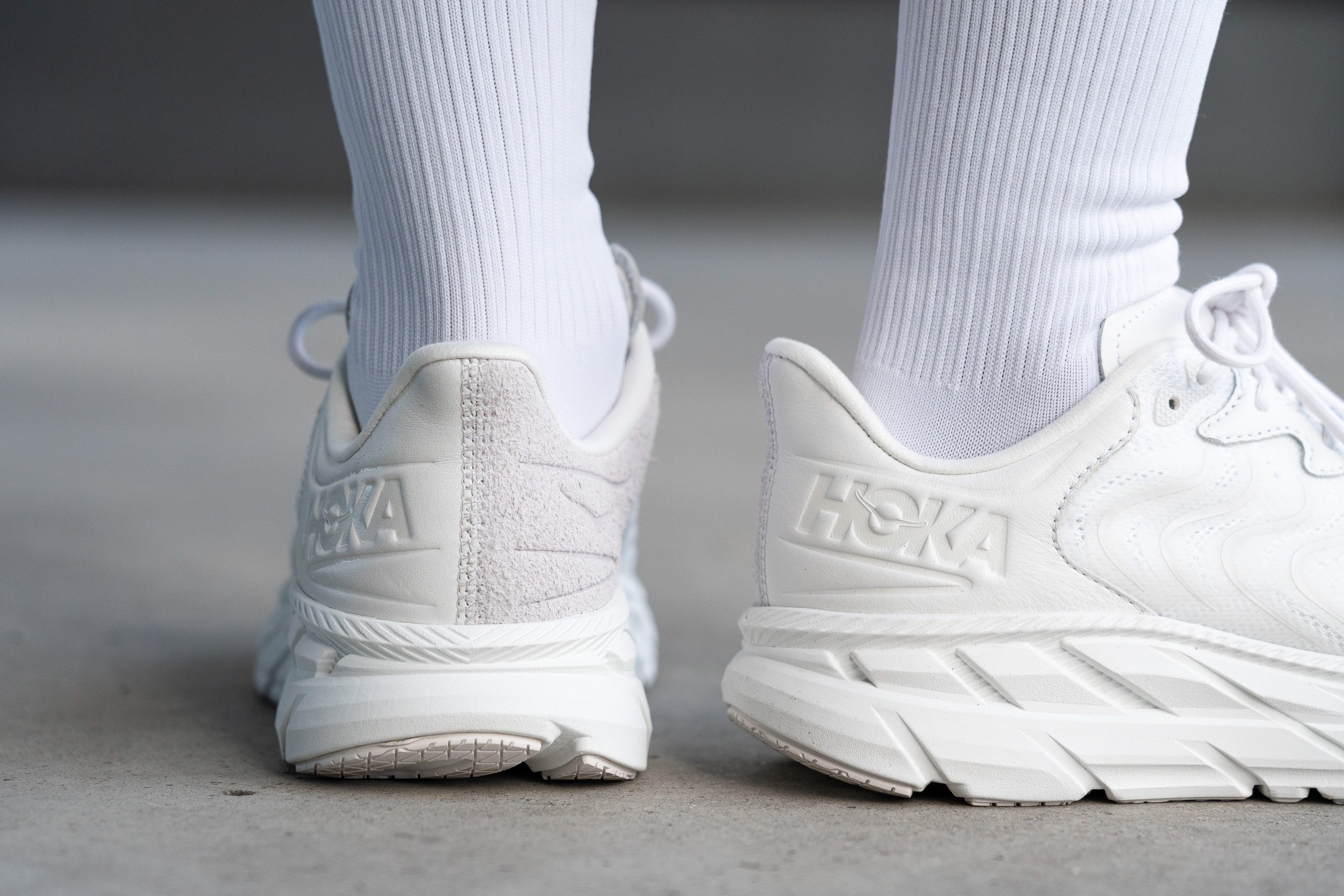
That’s why it is crucial for your comfort to choose walking shoes with the following features:
- Support and stability: High torsional rigidity (hard to twist), stiff heel counter that holds the heel and ankle in place, and a wide platform.
- Balanced or firm cushioning: At least 20 HA to prevent wobbliness because extra soft shoes will make your feet work harder to stabilise the body.
- Accommodating toebox: Shoes with a roomier fit and stretchy upper fabric, or you might as well consider a wide or extra wide option.
Women’s walking shoes for diabetes (A5500)
You may wonder what high blood sugar has to do with footwear but, unfortunately, ladies who have been diagnosed with diabetes are at risk of developing neuropathy, calluses, or even foot ulcers due to poor blood circulation in the feet.
And because a recent study showed that only 36% of people with diabetes were wearing proper footwear for their ulceration risk class, it is important to stress the need for proper walking shoes. Not to sound dramatic, but the worst-case scenario can end with a leg amputation.
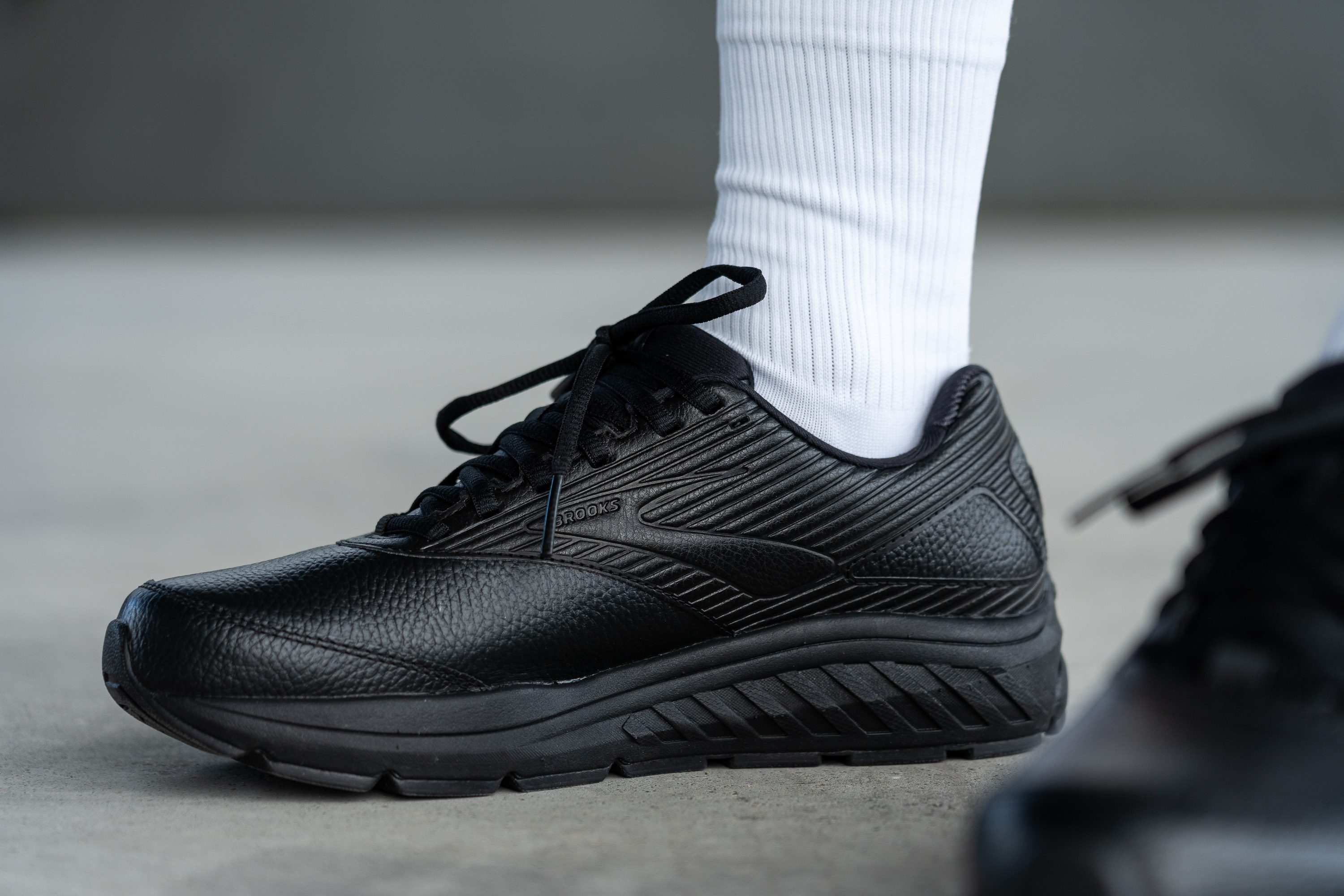
To make sure your feet remain safe and sound, look for walking shoes that are marked with the A5500 code. It means that they have been approved for diabetes and are subject to compensation by Medicare. Some of the acclaimed athletic brands that make diabetic-approved shoes are New Balance and Brooks.
TIP: When you try a shoe for the first time, make sure that it has enough space to accommodate your foot and your custom orthotic (if needed). There must be NO tightness, pressure, or irritation at all.
Concrete, cobblestone, tiles, or trails - women’s walking shoes for every surface
To be honest, in most cases, you can just wear the same pair of walking shoes on all urban surfaces without trouble.
But if you are tired of seeing premature wear on your shoe outsoles or find yourself slipping dangerously on wet floors, it may be worth getting a walking shoe that’s better equipped for the type of surface you regularly tackle.
Women’s shoes for walking on concrete
If hard concrete starts taking its toll on your legs and shoes, we recommend that your next pair has the following features:
- More cushioning: Shock absorption of at least 100 SA.
- More durable outsole: Avoid shoes with exposed foam.
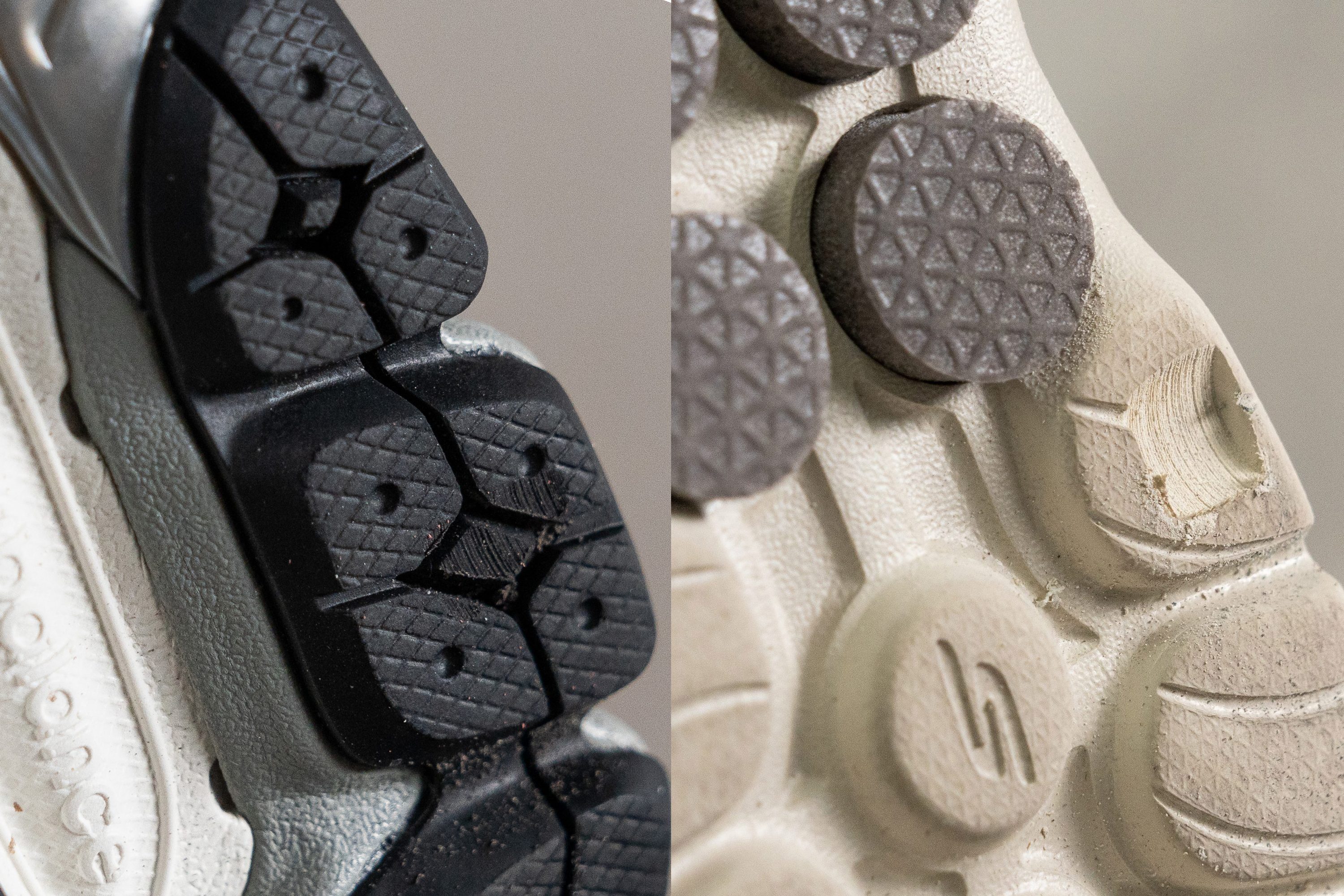
But how do you know if the outsole is durable? In our lab, we measure two parameters to find that out: outsole thickness and its ability to resist high-speed drilling with sandpaper.
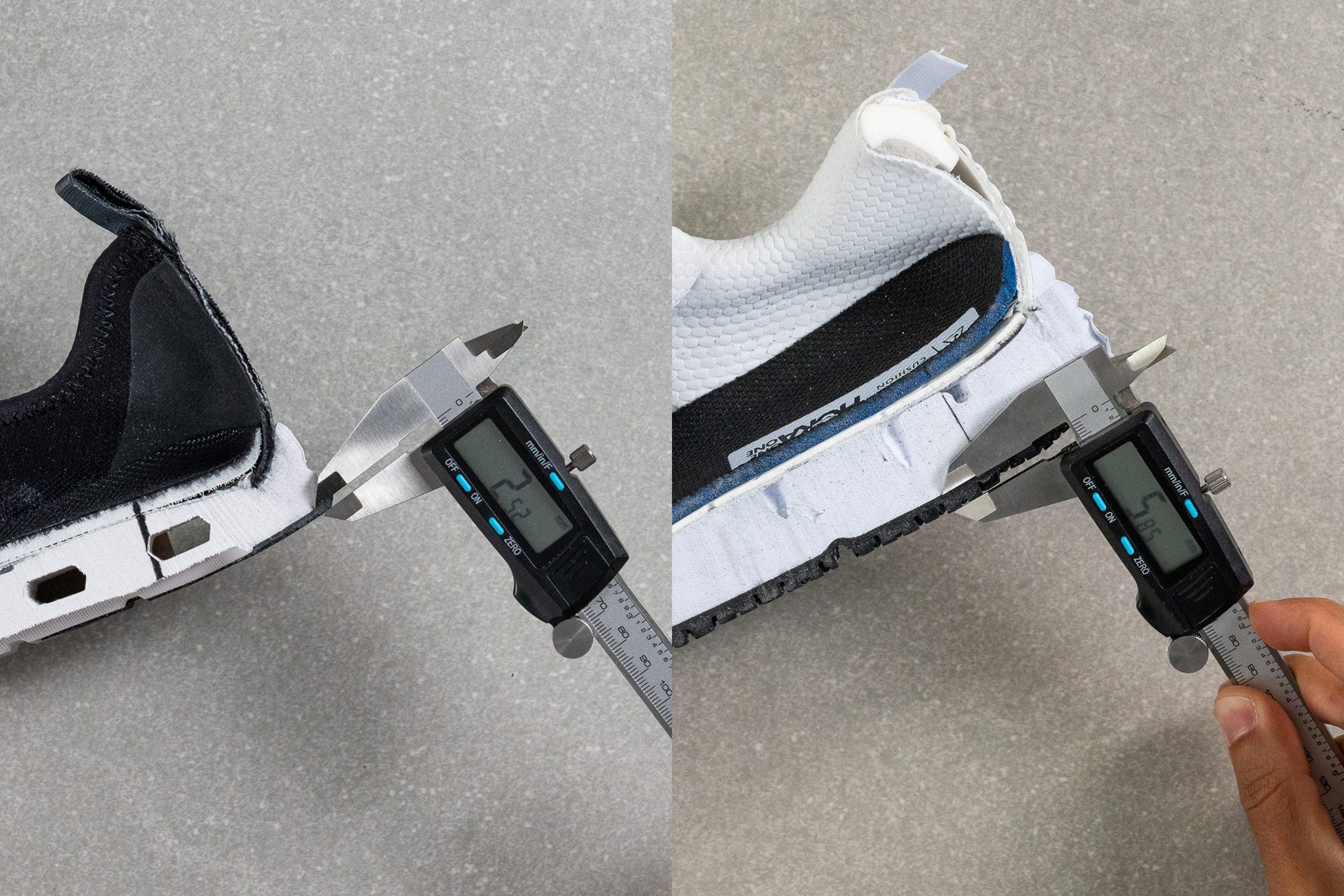
We recommend that a walking shoe for concrete has at least 3 mm of outsole thickness. But the more the merrier!
NOTE: The lower the Outsole durability measurement, the stronger the rubber.
Women’s shoes for cobblestone
Cobblestone streets look pretty in the pictures but can be rather tricky to walk on, especially when wet. Especially when going up or downhill. Here are some of the shoe features that can help you feel more surefooted on this old-fashioned surface:
- Sufficient cushioning: At least 100 SA of shock absorption to mute out hard stones.
- Moderately firm and stiff: Overly plush and pliable shoes feel extremely wobbly on this uneven surface.
- Durable rubber outsole: Exposed foam wears out fast and feels dangerously slippery on wet stones.
- Laces over slip-ons: Slip-on shoes lack proper lockdown and side support, causing too much in-shoe play on uneven roads.
Smooth and wet floors call for slip-resistant shoes
Isn’t it shocking that slips, trips, and falls in the workplace cause nearly 700 fatalities per year in the USA alone? And how many of those could have been prevented with proper shoes?
If you walk on tiles and linoleum every day and don’t want to tempt fate, it’s worth getting a walking shoe with a slip-resistant outsole.
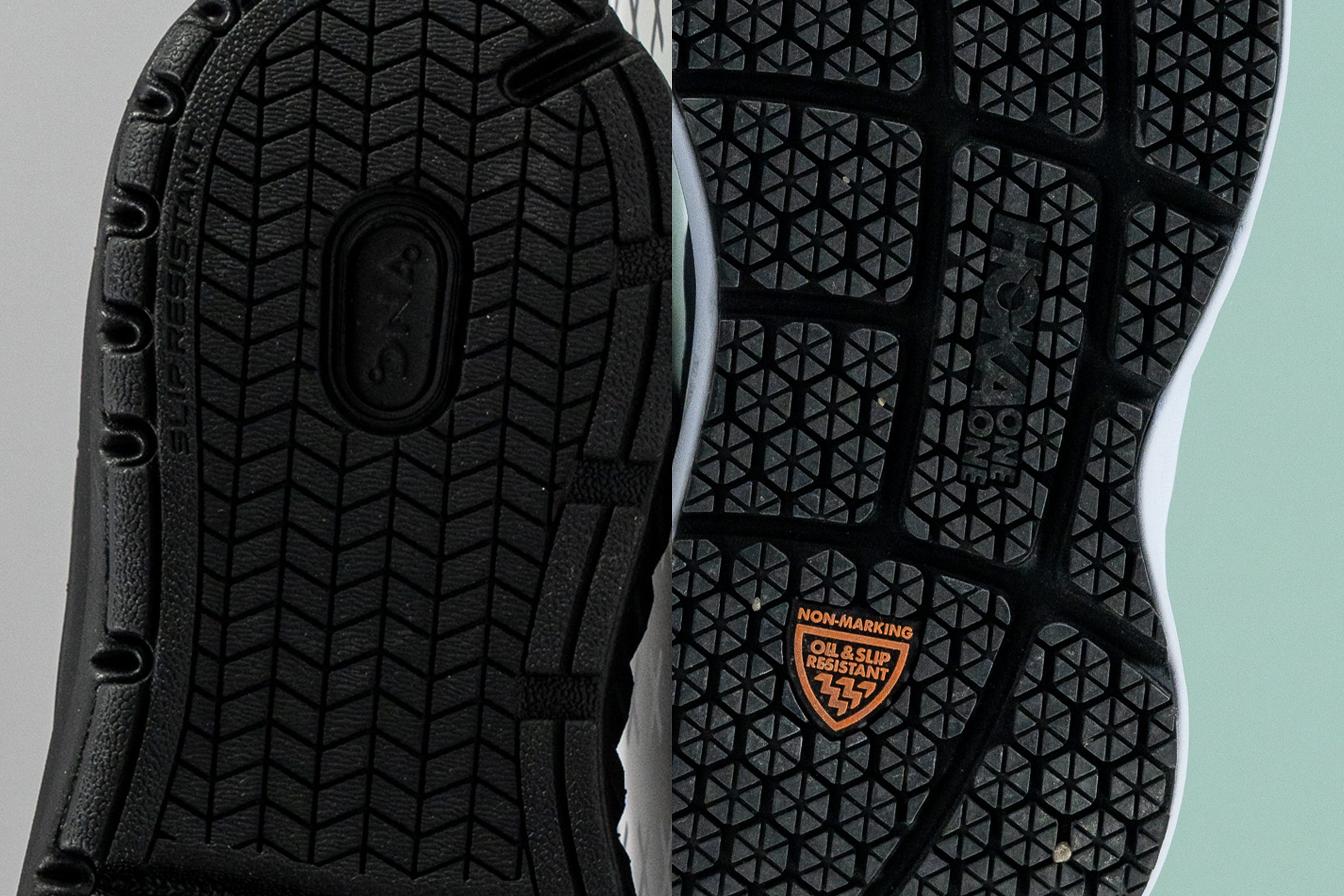
Brands normally mark shoes with slip-resistant properties at the bottom of the outsole as well as in the product specs. You can also find certification marks from a third party (like SATRA) confirming their slip resistance.
And, of course, we double-check every brand claim in our own lab following the SATRA TM144 method for testing shoe traction. We expect a friction coefficient of at least 0.45 from shoes with slip-resistant outsoles.
Aside from the slip-resistant options, here are some grippy women's walking shoes that will keep you confident on smooth and slippery urban surfaces.
Women’s walking shoes for trails
While these are NOT proper hiking shoes, they do have a slightly more aggressive treading than a typical walking shoe.
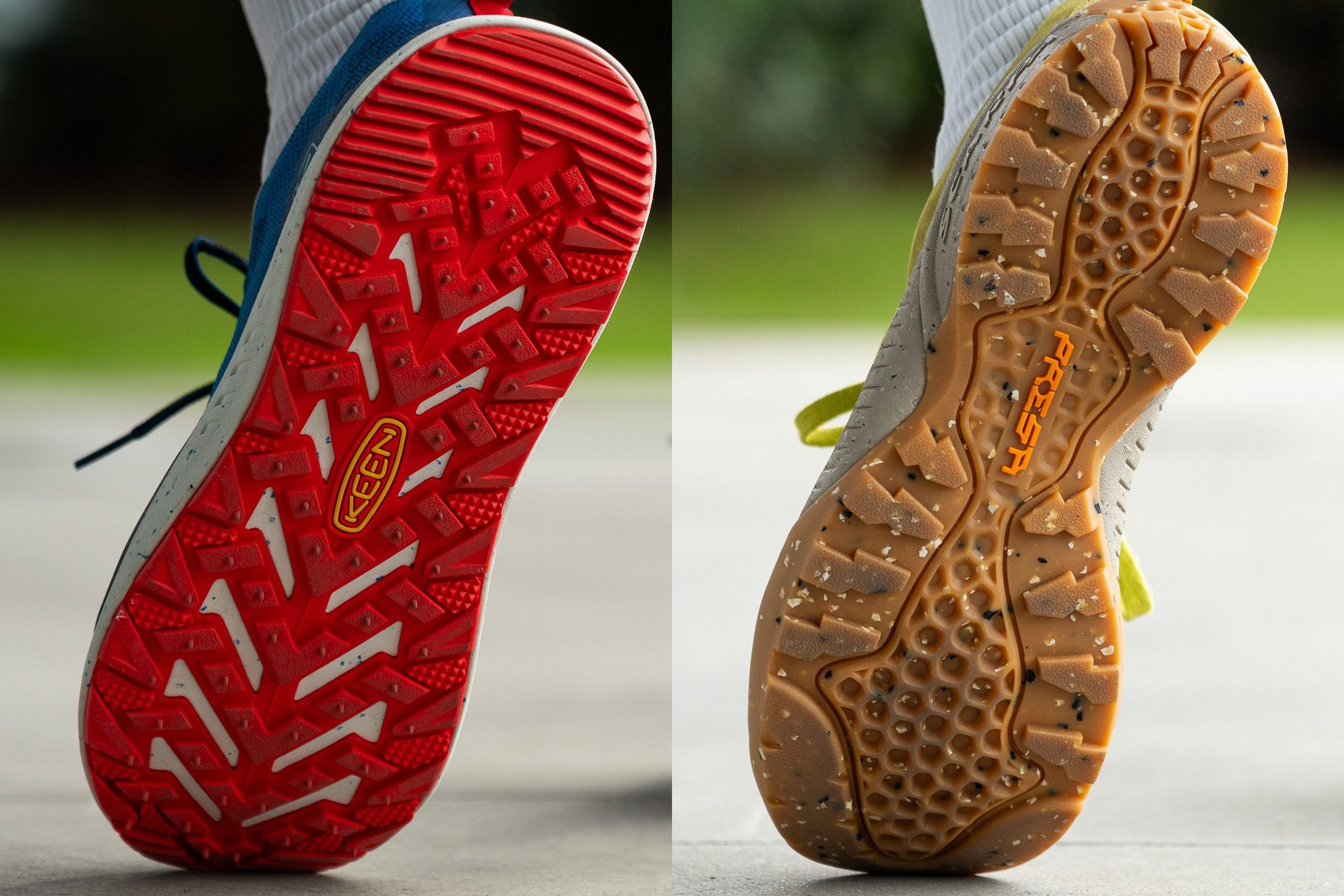
These shoes are great for ladies who regularly trade city streets and pavements for well-maintained trails. Not too rocky or muddy though.
Women’s walking shoes for summer, winter, and mid-season
There is no bad weather, right? As long as you have the right pair of shoes on.
Equipped with a smoke-pumping machine, an LED light, and a microscope, we are here to tell you which shoes have the best breathability for summertime and which ones are better to save for the cold and rainy season.
Shoes for summer and hot temperatures
You obviously need the most breathable walking shoes to keep your feet fresh and fragrant-free when the cruel summer hits. That’s why we thoroughly test each shoe’s ventilation capacity and only recommend options with the highest breathability score of 5 in our summer shoe catalogue for ladies.
Women’s shoes for moderate weather
A lot of women’s walking shoes fall somewhere in the middle between breathable and warm. These shoes received breathability scores of 2,3, and 4 in our lab tests, so it’s up to you to choose how much airflow you need in a walking shoe in mild weather.
Warm and waterproof shoes for low temps, rain, and snow
The warmest walking shoes earned the lowest breathability score of 1. They feature very densely woven upper fabric and are often enhanced with waterproof membranes like Gore-Tex (GTX).
